#its because both characters are Very Strongly Associated
Explore tagged Tumblr posts
Text
Rin, Kabru, & Toshiro: On Asian Identity
I have a lot of thoughts about Rin's identity as a second-generation Asian refugee and how it impacts her relationships with other characters, especially Kabru.
I see Rin as being Indonesian specifically. The name "Rinsha" is of Muslim Arabic origin. In real life, Indonesia has one of the largest Muslim populations in the world, so what might seem like a geographically incompatible name works if Rin is the Dungeon Meshi equivalent of Indonesian.
Rin also says that her parents came from an island that isn't Wa, and Indonesia is a series of islands.
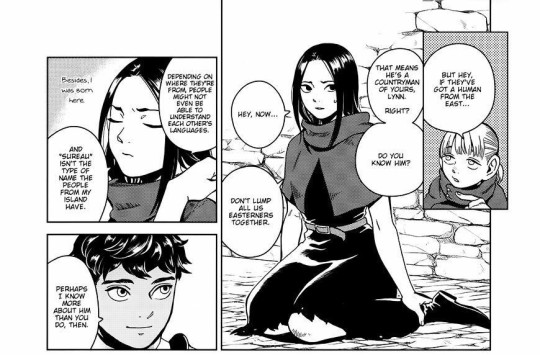
In her Adventurer's Bible entry, she's described as having "no real knowledge or attachment to the East" because "she's second-generation." She also clarifies to Mickbell that she was "born here." From this character description and her dialogue, we get the sense that Rin doesn't really identify with being Asian.

As noted in this Rin masterpost, a large part of this is because she was denied her parents' cultural identity by the elves. They likely suppressed any cultural markers she had and denied her information about her heritage. Since she wasn't born in the Eastern Archipelago and her parents died when she was young, she understandably hasn't inherited a lot of cultural knowledge.
Rin seems to have internalized ethnic self-hatred. Her disconnect from the East and her unwillingness to remedy that disconnect suggests that she has shame surrounding her Asian identity.
Again, she doesn't have many opportunities to interact with people from her parents' homeland, and her trauma also impacts her behavior. Remembering her parents is probably painful, considering the horrible way they died, and since they're her main connection to her cultural heritage, it makes sense that she wouldn't broach the topic.
You could also argue that Rin identifies more with her Northern identity than her Eastern identity since she was born and raised in the North for the first eleven years of her life, and as a result, she doesn't feel the need to connect with her parents' culture. But considering her home was presumptively still steeped in her parents' culture and her main association with the North is probably her parents' murders, this seems unlikely.
It's important to note how different her experiences are from the story's other Asian characters', like Toshiro's, for example. Toshiro travels to the Island as an adult of his own volition (technically, his father's). He's completely culturally Eastern. In comparison, Rin's parents fled from the East. Her family had to assimilate into an unfamiliar Northern culture, and later, she was "raised" by western elves, who are coded as colonizers in text. She seems to have internalized the elves' suppression of her culture and the way assimilating to the North required them to discard parts of their heritage. Her lack of interest in her culture seems learned.
Her strong attachment to Kabru further complicates her relationship with her Asian identity. I see Kabru as Indian or Nepalese; his name derives from a mountain on the border between India and Nepal. On top of being the only person who treats her like a human being during her childhood, Kabru is the only other significant Asian person in her life. They share the trauma of their parents having been brutally murdered and being raised imperfectly (much more severely in her case) by elves. While in the elf's care, they're both othered as tallmen— this aspect is strongly emphasized in the text — and in the main story, they're othered as Asian people in its European-inspired setting. Their shared experiences as Asian refugees are the foundation of their close bond.
It's not a stretch to assume that Rin consequently views Kabru as her main connection to being Asian. While they're from very different parts of fantasy Asia, their experiences as Asian refugees still overlap significantly as seen above, and the way she clings to Kabru suggests she wants to connect more with her culture, but for the previously stated reasons, she doesn't prioritize it. Besides, she doesn't have good models for what embracing one's cultural identity as a refugee/immigrant looks like. Just like her, Kabru doesn't seem to have many cultural ties, similarly because of his upbringing with the elves.
Toshiro could completely topple Rin and Kabru's original dynamic. Rin doesn't seem to like Toshiro. Their personalities would probably clash at first, because just like him, she's prone to judgment, out of self-preservation, and she's quiet. One of their canonical interactions is being captured by the orcs together; they don't even speak to each other in this scene.

Kabru and Toshiro become friends by the story's conclusion. Deep down, Rin might feel threatened by this. She's been Kabru's closest Asian friend up until this point. Toshiro, as an Asian person who was born and raised in his culture, might seem like a "better Asian" and thus, Kabru's replacement for her. This would be the worst projection of her buried insecurity over her disconnect from being Asian and how it potentially separates her from other Asian people. Given her personality, I doubt she would express this beyond acting wary around Toshiro.

With time, Rin, Kabru, and Toshiro could resolve her fears and the deeper issues they point to by all becoming friends. Interacting with other Asian people would heal her. She appears unphased by Mickbell's microaggression, implying it isn't an uncommon occurrence; she seems to only hang out with Kabru and their party. Being around other people of color would lessen the amount of othering she experiences and grant her a break from defending her identity.
Beyond the potential for cultural exchange and bonding over being Asian in fantasy Europe, Rin and Toshiro are also very similar in character. They're both anxious, quiet, and caring. If they made a little effort, they'd relate to each other and get along well.
Ideally, Rin would also befriend Hien, Benichidori, and the other girls in Toshiro's party. Kabru and Toshiro have their own issues with their treatment of women, so without positive Asian female friendships, she'd have another issue on her hands. Still, Kabru could be the bridge to a friendship with Toshiro, and Toshiro could be the bridge to friendships with his retainers. And with mutual growth, they could all enjoy each other's friendships.
Rin herself points out the vast cultural differences and language barriers between different parts of the East. The Asian characters of DunMeshi might not always share culture, but because of the story's setting in fantasy Europe, many of them experience being nonwhite in a mostly white locale. A support system of other people of color could allow Rin the space to explore her identity and culture and begin healing from her childhood trauma.
#rinsha fana#rin dungeon meshi#dungeon meshi#dunmeshi meta#kabru#toshiro nakamoto#shuro#kabru of utaya#my silly thoughts abt rin but also just me heavily projecting other asian am ppl in my life onto dunmeshi charas#love rin dearly#it's so important to me that all the asian charas become friends and bond over being asian#dunmeshi#delicious in dungeon#*mine#*meta
168 notes
·
View notes
Note
I've found it interesting that both Jax and Ragatha are essentially two sides of the same coin. How they mask their true feelings and interact with others is always some kind of front.
However, they both seem to have tried to reach out to Pomni in a way they hadn't with the others (Jax after Pomni spent an adventure with Kinger, his attempt at reaching out at Spudsy's) (Ragatha pretty much all of episode two etc)
I am wondering that, since she is new, they are trying, in their own way, to get validation from the new person without realizing it yet.
i agree so so much!!!! jax and ragatha feel like theyre very specifically associated with one another writing wise VERY deliberately. the theme song alone separates the characters into chunks (gangle zooble and kinger. ragatha jax and kaufmo) that pair the two up, theyre constantly interacting, that they share two spotlight eps, and so on. almost all of the characters, imo, have some sort of narratively significant dynamic, but jax and ragatha is absolutely one that is given extra detail, which definitely highlights the idea that theyre VERY different but also VERY similar in an important way
jax is decidedly the most Mean of the cast, and ragathas the most Nice, put simply (bc that is subjective, but i think the opposite degrees of friendliness the two exhibit are pretty clear), but that in itself IS some sort of mask, with their masks getting partially dropped in ep 4- i dont think theyre fully dropped and i dont think it has to do with 'jax is secretly nice' or 'ragatha is secretly mean' so much as the episode highlights the idea that theres more context to why they act how they do, and that the two of them are both putting on some kind of performance, though the extent of that isnt so cut and dry i think
i think ive seen it described better by others than i could but i think its very much that they are what the other lacks, in the least healthy ways possible. id consider them foils, because a person could argue theyre far more similar than meets the eye (with the severity of their masks and that both display an at least partially disingenuous happiness) but i think that they still mirror each other strongly enough that its them being foils that actually highlights these similarities at all- everything they do is opposite from one another, even down to how they treat the npcs (jax enjoying the idea of causing them harm because theyre not real, it doesnt matter, he can do what he wants, vs ragatha whos as kind as possible to the npcs, the reason for which being unclear since she doesnt seem to view them as alive, but likely a need for approval, so she does what she wants, too), but it has a similar root cause for WHY they do these things, and how it impacts their personhood by slowly stripping them of themselves
the two absolutely seek approval so so hard. ragathas more blatant in it, stating directly that she wants jax to like her even if she hates him- that she doesnt think pomni likes her (the idea of which causing her distress). she needs people to like her so bad. theres a lot of possible reasons for this but frankly it really seems to stem from her placing her own self worth on the care of others. it distresses her deeply when she thinks someone doesnt like her. on the topic of the npc thing it DOES seem like its some attempt at being cared about, even in an absurd situation. ive discussed it before, but it reads like fawning, HARD, particularly when shes around kaufmo- it makes no sense for her to try to appeal to his emotions, to apologize to him and try to convince him of something that would make him less upset, even if its not true, when she KNOWS you cannot really reason with abstracted players
it reads more like instinct, then, that others need to like her and shell do anything even if its putting on a face in order to maintain that. its not healthy and reads as insincere to others at worst, and makes it hard for others to know whats real with her- but she seems to genuinely care. its just that once you base your entire identity socially on others liking you, or being liked by as many people as possible, the line between you and the fake, palatable version of yourself becomes blurred to the point of hardly being visible. it makes it hard to maintain that approval longterm, because it damages trust and damages her own sense of identity, which runs the risk of making an awful gradually deteriorating loop of her trying HARDER to appeal to people and putting people off MORE in the process
jax doesnt seem to care so much, sort of. hes a little confusing to break down bc he is deeply contradictory (not in a poorly written way, hes just quite fucked up). he likes to do what he likes to do. he likes to do things he finds funny. but ive mentioned it before, that i dont think he hates them. theyre entertaining and the fact that he keeps his face up around them implies that he does care what they think of him. during the evaluation, he says 'no one can see this, right?' hes the most emotionally repressed person alive as said by gooseworx herself, but this is a performance for himself and highlights that he assumes others have the same expectations of him, too. he cant be uncool, but WHY does he care if the others thinks he is? if he truly didnt care about the others opinion of him, hed just... never pretend. how can someone so obsessed with doing anything that HE finds fun regardless of others opinions of him STILL give a shit what anyone thinks? (is it because he wants the appearance of having it together? but then, thats dictated by others view of him, not the other way around)
i see it interpretted that his shittiness is him lashing out at people, which i think is true somewhat but not quite in the typical way. i dont think hes unhappy and snapping at people because of it. i dont think the circus made him an asshole, so much that i feel like he was already a bit unpleasant to others, but with no true consequences, and being deeply unhappy made him start leaning on being MORE of a dick. hes unhappy, so hes going to BE happy, and if that means throwing someone of a truck for laughs or pushing people around or dropping them in deep fryers so be it. its not real anyway. its a desperate desire for joy at the expense of others. but this is destroying any semblance of companionship he could have, and given that i think hes the MOST social of the cast, constantly talking to people and joining things, i think this has worn at him in its own way
(both jax and ragatha seem to had deeply adapted to the circus but in cartoonish ways- ragatha treats it all like its real for comfort. jax treats it all like its fake but engages in the cartoon bullshit it all has to offer)
thinking on it, what with how pomni assures gummigoo and what kinger tells pomni, theres probably something to be said about the fact that, of anything, the only real thing IN the circus is how people feel about one another. when everything around you is fake, the only real things are other people and your interactions with them. ragatha and jax both seem keen on participating in distractions (jax avoids participating actively in the pilot but he DOES suggest the adventure, and seems to have a lot of fun participating in ep 2- though its in his own 'everything should go my way and if it doesnt ill mope about it' way. ragatha outright speaks positively about them as a way to keep the players minds 'healthy and stimulated' and seems to see them as a genuine attempt on caines part to keep everyone sane. theres something to be said about the stupid sauce too probably) and in putting on their faces to cope
but a new player doesnt have all these fake concepts ingrained in them yet, and pomni as she is is a deeply blunt person on top of that. she acts often on instinct but she also speaks her mind openly (really, shes who jax WANTS to be... sort of. if that makes sense). of anyone in the circus, she IS the most 'real' and how she treats people is genuine, and it makes me wonder if jax and ragathas interest in her isnt JUST a desire for companionship bc of the inherent loneliness and isolation of the circus and how that wears on a human, but further, a desire for something truly real in their lives; a genuine connection with a person who is utterly sincere. something real, despite it all
#ask#tadc#circus discussion#i think ragatha also operates from a place of genuine concern#she wants to make sure ppl are ok which imo partially sstems from her being stated to have seen multiple players abstract#(frankly likely Many)#and w how she puts it on herself to help others it makes me think she probably feels guilt over the ppl shes seem abstract :(#that if she doesnt help what if the worst happens?#jax on the other hand is like...#i dont think its quite a 'pushing people away because theyre gonna abstract anyway'#i mean. maybe a little? but not quite in the way ppl assume that works#so much as i think its 1. not smth he intentionally does#and 2 that hes simply decided its not all worth the effort rather than smth he actively prevents#(given that he seems to be approaching pomni often)#hes unpleasant and he knows it and being someone ppl want to be around requires more effort than its worth#and i dont think he realizes how lonely it makes him#which i feel like has turned into a gradual downward spiral#of 'people dont like me bc im an asshole so i dont care if they like me ' then becoming more unpleasant bc hes around ppl he has#awful relationships with that further feeds into it#its a self fulfilling prophecy of 'im treating people bad and they dont like me bc of it + they dont like me so i dont care what they think#and will keep treating them bad'#but YA#i feel like this is all over the place buuuuut jax and ragatha highlight very interesting concepts in the show#thru their differences... smiles
27 notes
·
View notes
Text
Sins, Virtues, and Motivations: A Critical Analysis of Characters in Shall We Date?: Obey Me!
In this essay, I will argue that each demon brother some of the demon brothers can be associated with a sin (no duh), a virtue, and a core motivation--and that this motivation is best pursued through a synthesis of that sin and that virtue. Hegel would be very proud. Yes, this is critical media analysis. No, I will not try to explain the twisted, broken path that led me to this point in my life.
I will be looking at Lucifer, Mammon, and Levi in this study. Their core sins are obvious - Pride, Greed, and Envy. Their accompanying Virtues and Motivations are listed below.
I used the Seven Heavenly Virtues for this little game. These are Prudence, Justice, Fortitude, Temperance, Faith, Hope, and Charity.
They should not be confused with the Seven Capital Virtues, which are inversions of the Seven Deadly Sins. These are Humility, Charity, Kindness, Patience, Chastity, Temperance, and Diligence. I tried these first and damn were none of them easy to match up. Tell me, fandom for this mobile game designed for players to lust over hot demon men, which brother should have the "chastity" virtue?
Lucifer
Core Sin: Pride. Core Virtue: Fortitude. Core Motivation: To protect his family.
Lucifer's core motivation is to protect his brothers. He looks at this as a sort of penance for the outcome of the Great Celestial War. He knows that he's the reason they rebelled, and he feels responsible for their wellbeing. He is able to endure the relentless pressure of the responsibilities he puts on himself thanks to his core virtue, fortitude.
Fortitude is strongly associated with courage. Specifically, it is courage in the face of pain and adversity. We see him displaying this trait any time those he cares for are in jeopardy, and it often helps him make difficult decisions where neither outcome is ideal. Lucifer is decisive, canny, and accepts the consequences of his choices, good or bad.
His driving motivation is also bolstered by his core sin: pride. He views himself as ultra-competent, while his brothers consistently make mistakes; beyond that, it's only natural that he take responsibility for the choices of his brothers (like the choice to join him in rebelling) because he is so significant an influence as to virtually rob them of their autonomy.
This has led to Lucifer having a somewhat toxic relationship with his brothers. Lucifer often acts as a parental figure rather than a peer, while the rest of them are all in arrested development of some sort, often acting more like kids than the adults they insist they are.
Lucifer either doesn't recognize that by doing everything for the family on his own, he's stemming their ability to grow and learn, or he does know the consequences of what he's doing and he feels conflicted about it. He ultimately blames himself for the fact that they're all in the Devildom in the first place, living as avatars of sins to the extent that they struggle to function as independent adults.
So, while fortitude and pride allow Lucifer to simulate the act of protecting his family, it's a matter of perspective whether controlling every element of their lives is protection or harmful coddling.
Mammon
Core Sin: Greed. Core Virtue: Charity. Core Motivation: To be valued and valuable.
Mammon is simultaneously a vessel of greed and its inverse, charity. This is because his core motivation is twofold, and those are the rewards of greed and charity; to be valued - to fulfill a want, to be desired, to look flippin' cool - and to be valuable - to fulfill a need, to have inherent worth, to serve a purpose.
Setting aside his unhealthy relationship with money, let's examine how Mammon behaves and what his deeper interpersonal motivations tend to be. He clearly places a high value on his brothers and MC, and he has shown on multiple occasions that he is willing to put himself at risk to help or protect them. Early on in both the original game and in NightBringer, Mammon attempts to heroically rescue MC (and his younger brothers, in NightBringer). In both cases, though, Lucifer shows up and does it for him. Mammon's pursuit of his core motivation clashes with Lucifer's quest for his, and Lucifer is strong enough to simply take it from him. Although in NightBringer he and his brothers do earn the not-insubstantial reward of the title "Lords of the Underworld" after Lucifer's rescue, he appeared so dejected by Lucifer's oneupmanship that he spent a good portion of the next day sulking. In the original game, Mammon wants MC to promise that they won't be saved by anyone else besides him in the future. It appears that his greed for an improved status in his interpersonal relationships is left unfulfilled.
Mammon wants to be heroic - to be valuable - and he wants to be admired for it - to be valued. The cognitive dissonance that accompanies motivations like these is all that sustains a person with such a diminished sense of self-worth.
Speaking of a diminished sense of self worth...
Leviathan
Core Sin: Envy. Core Virtue: Hope. Core Motivation: To find joy in the things that give him joy.
Confusing motivation? Yes it is. But envy is a confusing sin. All the other sins--pride, greed, wrath, lust, gluttony, and sloth--are enjoyable to indulge on some level. Losing your temper when you feel you've been wronged, or eating a bunch of delicious food, or sleeping through the snooze alarm: We know why we do those things. We might regret them later, but we indulge them in the moment because of the enjoyable side.
There is nothing enjoyable about envy. Wanting something that isn't yours, that belongs to someone else, be it tangible goods, talents, a partner, a job... is nauseating. And it makes you feel like a bad person, and it drains the joy out of things that you used to love. Speaking from personal experience for a second, when I was a teenager, I played music in a company with a much younger musician who was incredibly talented, and I was deeply envious of her. I wanted her talent; I wanted the praise she received; I wanted to impress people; I wanted what she had. But there was nothing I could do. I hated feeling that way, but I couldn't shake it. And it ate away at my desire to play music. It took the joy out of something that once gave me joy.
You see the connection?
Levi struggles to find pleasure in anything he does, despite how many interests he has, because, in spite of his blustering dismissal of all things "normie", he is deeply envious of those he perceives as his social superiors. Now, I am not in any way saying that Levi is or would be an inc3l, but there's an element of his character that has a strong parallel to inc3l culture. The idea that there is something fundamentally wrong with him that prevents him from achieving what he wants socially and that the only way he can protect himself from those who would ridicule him is with a defensive contempt for the group that rejects him... Does any of that sound familiar?
But Levi is not an inc3l. No, not because you're willing to **** him and his two *****, though I'm sure that helps. It's because he has his core virtue: hope.
Have you ever heard of the black pill? It's kind of like the final stage of inc3l culture, where you accept that you're not an alpha male, you'll never be one, you'll never be accepted by a woman, you're ugly and unloveable, and you might as well just stop existing. It is sheer despair.
Levi maintains hope for the future, even if he prefers not to admit it out of fear of jinxing himself. He is able to form a deep bond with MC, who he views as a "normie", without renouncing his hobbies or being mocked for them. In fact, I would argue that the anxiety Levi sometimes displays over the possibility of being made fun of (for example, in NightBringer when he considers trying out cosplay) is emblematic of the hope he has that he can be accepted.
"But wait, daytaker," you say. "That doesn't sound like he's making progress towards his core motivation of getting joy out of the things that bring him joy! Being self conscious is not joyful!" Well, you're right. What Levi needs is to somehow find the right balance between enjoying his hobbies and allowing himself to enjoy other people as well. As we can see from his effusive excitement in sharing his favorite games and stories with MC and his brothers, the social component of media consumption is a major component in making it enjoyable. If Levi loses hope, he loses that connection to the world offline, and if he loses that connection, he loses the joy.
@blackstqr (I did it.)
#obey me#obey me leviathan#dthc#obey me luficer#obey me mammon#long form#jesus fucking christ#i censored inc3l just to avoid being searched by any undesirables#starts out like an academic paper and ends like me drinking a beer and pointing at my phone#wow guys it's so deep#obey me headcanons#obey me scholarship#obey me nightbringer#text post#hc#hcs#lucifer#mammon#levi#is this satire? i don't even know anymore#i almost did satan too but i got like 3 sentences in and said nope#levi thoughts#mammon thoughts#lucifer thoughts
146 notes
·
View notes
Text
i think what a lot of ppl miss about the nuance when it comes to the retcon is that the POINT of it is that its a bad ending. homestuck is designed to be a tragedy and it was never going to end well; its frankly ridiculous to try and shoehorn in a scenario where none of the current main characters are dead when the story is ABOUT death. its not narratively satisfying at all like this! but thats not what the kids wanted (and, more to the point, thats not what the FANS wanted. newer fans DEFINITELY miss the fact that homestuck was written as a conversation between hussie and the fans, a conversation that turned into an argument halfway through and led to a lot of things being taken in bad faith on both sides. but i digress; this is a watsonian post)
the retcon powers are very VERY explicitly described as the ability to change the alpha timeline. the 'whats supposed to happen' of it all, the premeditated narrative the story was written to fill. conversely, when aranea used the ring of life to come back and meddle, she is explicitly described as 'causing a doomed timeline.' and like, the thing about doomed timelines is that theyre meant to happen as much as theyre meant to be fixed. theyre how paradox space accounts for and incorporates time travel, and the existence of the doomed timeline is often NECESSARY for the alpha timeline to function. thats how you get davesprite, thats how the aradiabot that brought gamzee's honkHONK code back from his crazy murder timeline contributed to doc scratch's creation, thats why every dead dave helped the alpha timeline dave figure out what to do. if vriska was meant to have never died in the first place the timeline wouldve been doomed long before game over. the ring went to the wrong person, and thats the kind of simple fix sburb was expecting to solve with some time travel to get things back on track
the ring was supposed to go to someone else. probably vriska! from the alpha timelines perspective, it wasnt that long after her confrontation with john that she really changed and grew as a character. that she became someone who deserved a second chance. imagine: john uses his retcon as normal time travel, the way sburb comprehended it through the limitations of its code. he takes the ring before aranea can, goes to the dream bubbles, and has another conversation with vriska. maybe she doesnt even really want the ring anymore, and thats exactly the kind of thing that would convince john to give it to her. and she agrees, because he tells her terezi is waiting for her. they go back, they have the final fight, and people die. maybe they dont come back. but its the group of characters who earned the ending, who we watched grow up for three years
but thats not what happened, and it was never going to be what happened, because as narratively satisfying as it could have been? john and terezi wanted something different. john wanted everything to be OVER and terezi wanted the chance to make a different choice, even if it was wrong. theyre selfish; theyre kids. theyre tired of being characters in a story, of someone else pulling their strings. thats what typheus's choice was about, you know? and john made the wrong choice. some other version of john could have fixed things the "right" way, had our john decided to die instead. to accept the consequences of the doomed timeline and let pardox space fix it. hell, between roxys first instinct to just sit and let the void take her and terezis pointy horns offering a counterpoint we have some pretty blatant devil/angel on the shoulder imagery! and john making the same wrong choice he did when terezi first told him to fly to the seventh gate, except this time there was no davesprite on angel wings, no one left alive he cared about enough to listen to. because as much as john felt like he was SUPPOSED to fall for roxy, the girl version of his fathers lover, someone strongly associated with his half of karkat's shipping chart but without the complication of being a lesbian, someone HUMAN to repopulate the world with cut out of his apocalypse movie fantasies...... terezis way of thinking has always appealed to him more. because as much as he pretends its not true, john doesnt like to take things lying down, and he doesnt like when other people do either. he gets bored! hes attracted to the danger and morally grey self confidence terezi and vriska exude, so. he listened to terezi, and they brought vriska back.... without any of the character development she had gone through.
and its a bad ending, because of course it would be. and thats the point :) it was stupid to think two kids could meddle with the fate of the universe and it was stupid to think that these kids could have a happy ending so easily. but can you really blame them?
#it me#homestuck#retcon#john egbert#terezi pyrope#vriska serket#roxy lalonde#johnrezi#vrisrezi#so anyway my official stance on the retcon is 'its a bad ending but i liked it anyway'
292 notes
·
View notes
Text
A Tale of Two Peacocks
The Relationship Between Gabriel and Michael

Some weeks ago I said I would take on the challenge of looking at the relationship between Gabriel and Michael, then I got sidetracked writing something else* - which is not always a bad thing. But I want to return to this because its too good not to do a post on it, and before I get too deeply involved in the other writing.
This is definitely going to involve some NSWF language - hey, I can't help this, its in the script - so the bulk of this is going to be below the cut. But the short of it is, they have a fairly low opinion of each other.
We need to go back to S1, where there is an interesting set of parallel scenes we should start our discussion with that spells it out for us. The first one is in S1xE2, and the other is actually in one of the deleted scenes from the cold opening of S1xE3, and they both use parallel characters to inform us of what Gabriel and Michael think of each other.
It turns out I've already talked about the first one, in this meta here, where I discuss how Newt is a parallel for Crowley.
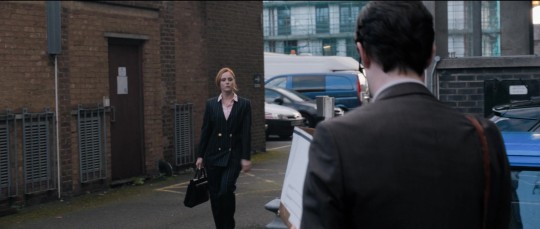
Then [Frobisher] power-walks past. Newt is not even worth her time stopping for. "Need a hand, Dick?" *Snort* - and ouch. That's a below-the belt joke. She's just called him a wanker. In the US you might use the term jerk instead. Someone who's a bit egotistical and more in it for themselves than others. (and I never thought I'd be fact-checking the meaning of this word ever, but there's always a first time...) She's basically just equated him Gabriel, in my book (and in more ways than one.)
And I wrote all that months before I started writing my Crowley-Gabriel parallel/foil series, too.
The other thing about this first parallel scene is the character of Frobisher, who is dressed very much like a demon, but is actually the parallel character to Michael, as we see later on in the paintball fight at Tadfield Manor.
(Er, I know this is all a bit 2nd/3rd hand evidence, but the second scene is a bit more direct, so bear with me.)
The second one, in S2xE3, is the deleted bookshop opening scene.
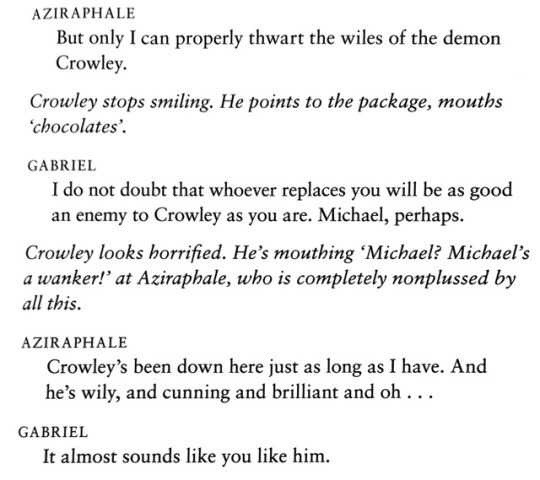
Source: Script for the unaired scene of Aziraphale opening his bookshop in 1800
Oh, look at that. Somebody is being called a wanker. Again. This time it's Crowley calling Michael a wanker, however, and its only one step to the side with Crowley being a parallel character to Gabriel (and I challenge you to watch s1 again in this light after finishing this post, and see how many similarities you can see between Crowley and Gabriel showing through even back then.)
OK. So we've established that Gabriel and Michael both think each other are wankers at this point, but what else can we find out about them?
Peacock Fighting

I've written a couple of posts about peacock symbolism. Firstly, Michael is strongly associated with having many eyes - their Ophanim ring, their costume has eye motifs, and they are essentially head of surveillance for Heaven. So this made me think they might be the peacock referred to in the Job minisode.
But later, after more research, it became apparent the lines paraphrased in Job were definitely referring to Gabriel. (See also Judgement Day.) There are associations with both royalty and vanity there.
They are both peacocks, but for different reasons.
And they are also both in competition with one another.
Gabriel Doesn't Have A Desk
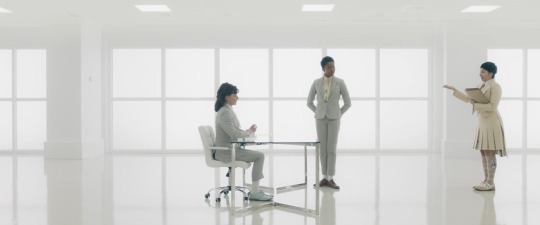
Desks are a symbol of power in western society.
The bigger, and more solid the desk in a corporate office, the higher up the person is.
The teacher at the front of the room, the authority in the room, has a bigger desk than the students.
Those desks offer protection to the person in authority sitting behind them. They mark a separation between that said authority and the masses they command on the other side. Only the most trusted get to come around to the same side that they are sitting on to be more intimate with them.
At work, your desk is connected to your identity there. Its your place in the organization. You may even individualize it with decorations.
Just take a look at what Newt was bringing on his first day to work in S1xE2:
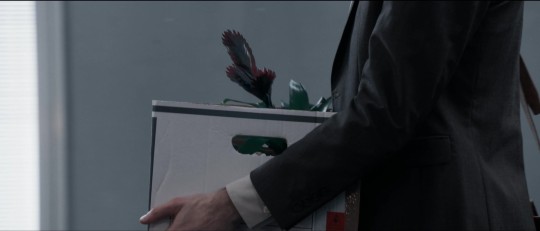
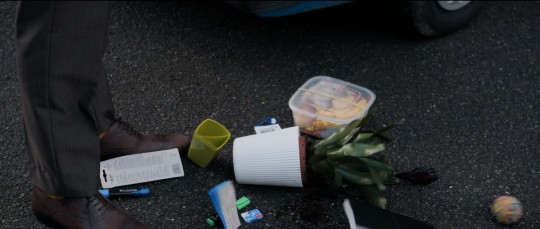
Pens, a pen holder, notepads, a ball of rubber bands, a plant (a bromeliad, a plant that does well in fully shaded damp environments, just like Hell) and some rations. Er, I mean lunch. Given to him by God Frances his mother.
The travesty of the modern trend of "hot desking" is de-personalizing the employee. They are no longer a valued employee with a valued place, they're just another faceless cog in the grind.
We see Michael behind a desk as Duty Officer in S2. It's starkly clean and sharp and made of glass, as we would expect to find in Heaven. It's used a shield and badge of office when we see them fulfilling that role.
Michael doubts Gabriel has a desk, although Gabriel insists he does, even though we have never seen it. Yet he still requires the proverbial archive box for moving locations?
I'm just going to leave the parallel between Newt and Gabriel there for further discussion. Please do remember the bottom falls out of Newt's box in the car park, leaving him with an empty box, too.
(Muriel has a glass desk, too, but interestingly they don't have a chair. You might like to compare their encounter with Aziraphale in the Job minisode to the escapade with Crowley in the present day. There is volumes said without words.)
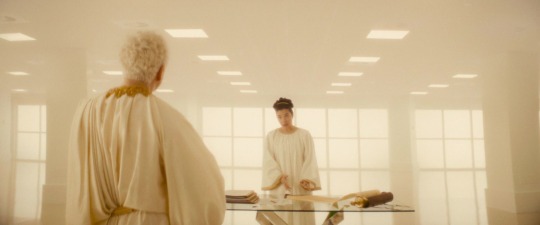
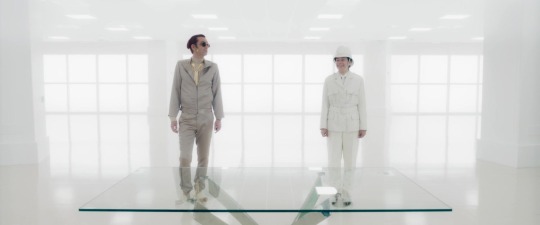
Just while we are on the subject of desks, thought you might like to compare Crowley's and Aziraphale's desks as well. They are always on about how much paperwork they have to do!
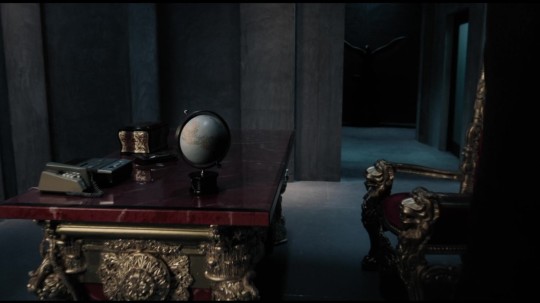
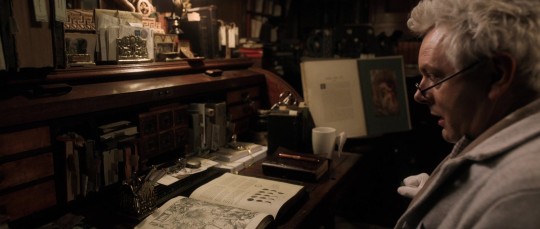
Sovereign versus Disciplinary Power
This is eventually going to turn into a discussion about fate versus free will at some point, but I do need to talk about the different types of power first, because I haven't done my long promised Power and Authority meta yet. The two concepts are closely related, and Gabriel and Michael are each acting as foils for a side of the concepts.
Gabriel represents sovereign power, the supreme legitimate power of the state. Power and action trickles down from the top, and punishment is almost a show of entertainment, but one designed to educate. "Oh, those angels Fell - if I do something bad, I might Fall, too!" And so Gabriel expects to Fall when he is given his trial, and Aziraphale when he lies to save Job's children.
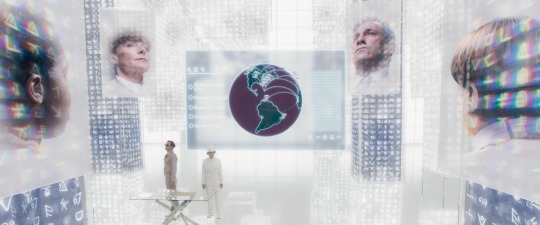
Michael is representing disciplinary power, something that lies at the heart of society today. This is where power is spread among individuals, and individuals are more likely to do their own discipline merely because of an overhanging threat of a possibility they may get caught if they do.** Are they being watched? Who might see and report their transgression? Michael has eyes (and ducks) everywhere... So does Orwell's book 1984.
This is a very simplistic view, of course - reality is more complex than that, and is usually a combination of the two, but we have to start somewhere.
Now lets throw the fate vs free will components into the mix. Let us revisit the story of King Cnut and the tide.
The story, if you are not familiar with it, is that Cnut had his throne set on the beach and commanded the incoming tide to halt where it was, and not to wet his robes or feet. Of course, the tide kept rising and splashed the king, where he leapt up and declared his might and power as a king worthless compared to that of God. The story is meant to demonstrate his piety before Heaven, and that he was not the ultimate controller of all things - his sovereign power was limited.
They say time and tide*** wait for no man - we are at the mercy of what ever fate they bring us, and we can't manipulate that. That's decided by the supreme power, the ultimate sovereign power, so to speak.
Gabriel tends to take this line - he does not have control over the summoning of the Four Horsepeople, they are just happening as they supposed to, and that's not his department. Plausible deniability, baby! Back channels? What back channels, Michael?
So if you did want to have some power over it, some free will to control outcomes? But hang on - every one else has free will as well. Sounds a bit chaotic. Who's in charge? Nobody. Everybody. Welcome to Michael's world. They want the power, they're prepared to fight for it, for what they think is right - but so is everyone else.
But what if you were the creator of free will itself? Would you be The One to have control over time and the tides?
Tadfield Manor, Again
Michael is the archangel who throws Lucifer down from Heaven, and we see this play out at Tadfield Manor during the paintball fight, when we are shown that it is actually Frobisher/Michael who shoots the shot that hits Norman/Lucifer in the heart - although we are initially made to think its Nigel/Gabriel who did it. (One day I will teach my self how to make GIFs and make a GIF of this.)
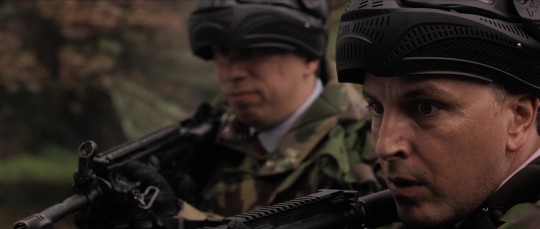
Frobisher is the more competitive one at all times - she is the only other employee besides the naive Newt to put their hand up when Nigel asks who is looking forward to the Training Initiative and she asks Crowley and Aziraphale "Who's winning?" as she runs past them inside - to which Crowley presciently declares "You're all going to lose."
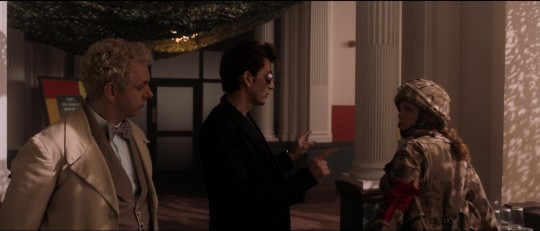
If you look at the extended scene in light of the above, you can see sovereign authority of senior manager Nigel/Gabriel is still floating around as a rather toothless tiger to the whims of fate, while everyone else is exercising their free will and disciplinary powers to try and control one another. And, as Crowley says, nobody wins. It's a lose-lose situation.
Michael is competing for an empty dream.
Gabriel is trying his best to survive something that is not what it seems.
And...I think I'll leave it there. Thanks for reading.
*I've started writing a multi-chapter human AU fanfic. But I'm a slow writer, and I'm not writing it in a linear fashion - because it has to be stuffed full of meta, of course - so I decided I better pull myself out of it before I got pulled in too far and finish a couple of things off so you didn't think I'd disappeared completely. I wasn't planning on doing one, but you know how these things go - one day an idea just pops into your head, the next thing the characters are talking to you and taking on their own life and a couple of thousand words later...
**There was a post about the oculus, (found it! thanks to gallup24) the round skylight window in the roof of the bookshop and the Panopticon, an infamous prison design where the prisoners can all see each other but can't see if the guard is watching them, but of course I've lost track of it, haven't I.
***The tides are controlled by the Moon and Sun, and ostensibly for this argument, by Heaven as well. They are fated to continue in their set orbit and/or path through the sky - or the Earth on it's orbit around the Sun, is probably the better way of looking at it.
#good omens#good omens 2#good omens meta#crowley#archangel gabriel#archangel michael#good omens analysis#tadfield manor#deleted bookshop scene#peacocks#job minisode#he doesn't have a desk#power and authority#fate vs free will#newton pulsifer#angel muriel#37th order scrivener
64 notes
·
View notes
Text
The real life inspirations behind new characters in Touhou 19 (Unfinished Dream of All Living Ghost) While I haven’t been posting much about Touhou as of late, I felt obliged to put together the customary post about the inspirations behind the new characters. The new game genuinely renewed my interest. In contrast with similar write-ups pertaining to previous games the research is not entirely mine - some of the sections are a result of cooperation between me and @just9art. Without further ado, let’s delve into the secrets of the new cast. Find out if Biten is the first “Wukong impersonator” ever, when a tanuki is actually a badger, and why Hisami both is and isn’t an oni. Naturally, the post is full of spoilers. Also, fair warning, it's long.
1. Biten Son - sarugami + Sun Wukong
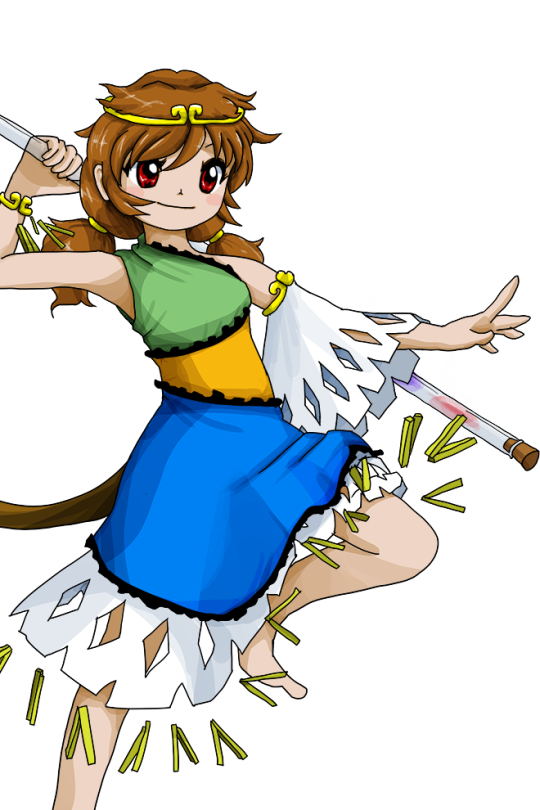
Sarugami means “monkey kami”, the monkey in mention being the Japanese macaque.To my best knowledge, the term is actually not used commonly in English - the results on jstor and De Gruyter are in the low single digits, Brill outright has nothing to offer. Translations are much more common.
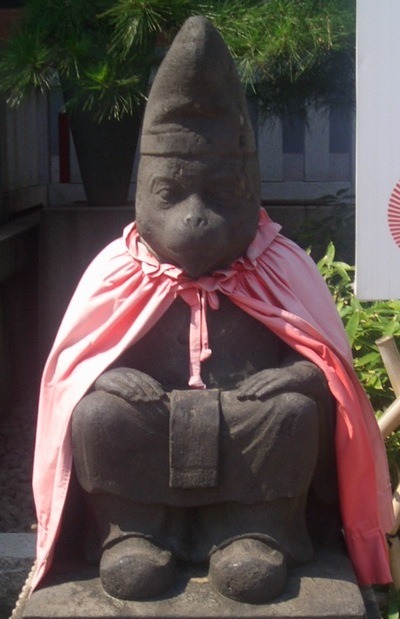
Sarugami are particularly strongly associated with Mount Hiei. You might have heard of it because of its association with Matarajin, though in this case he’s not exactly relevant. Instead, it is believed the monkeys act as messengers of Sanno (the “mountain king”), Sekizan Myojin and Juzenji. Sanno himself could take the form of a monkey according to medieval texts, while Juzenji can be accompanied by a deity depicted as a man with a monkey’s head, Daigyoji, known from the Hie mandala. Sarutahiko is also associated with monkeys based on the similarity between his name and the word saru. Bernard Faure notes that despite the clearly positive portrayal of monkeys as semi-divine beings in service of these deities, their perception in folklore and mythology can nonetheless be considered ambivalent, because they could be viewed as aggressive. There are even examples of sarugami being portrayed as monstrous antagonists to be defeated by a hero. The best known tale of this variety is known simply as Sarugami taiji. It is preserved in the Konjaku monogatari. Here the sarugami is a fearsome monster who terrorizes a village and demands the offering of one young woman each year.
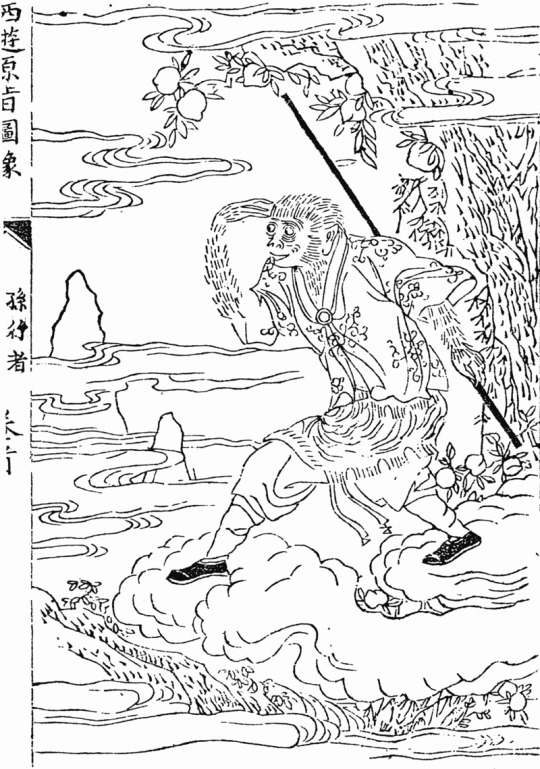
In contrast with the sarugami, I do not think Sun Wukong, one of the protagonists of the classic Chinese novel Journey to the West, needs much of an introduction. We reached the point where even in the west he is recognizable enough to warrant toys based on him (there’s a Lego Wukong on my desk right now). Biten's design has many callbacks to traditional portrayals of Wukong, including the staff (which in the novel is a pillar stolen from the undersea palace of a dragon emperor) and a very distinctive diadem (in the novel making it possible to pressure the unruly Wukong into obeying the monk he is meant to protect). As a curiosity it’s worth noting that “fake Wukong” is not a brand new idea - in the novel itself, one of the enemies of the heroes, Six-Eared Macaque, actually impersonates him for a time. Wukong is effectively himself a “divine monkey”, seeing as despite his origin as a literary character he actually came to be worshiped as a deity in mainland China, Taiwan and various areas with a large Chinese diaspora. The topic of Wukong worship itself came to be an inspiration for literature, starting with the excellent The Great Sage, Heaven’s Equal by Pu Songling, a writer active during the reign of the Qing dynasty, in the early eighteenth century.
2. Enoko Mitsugashira - “immortal yamainu” + Cerberus
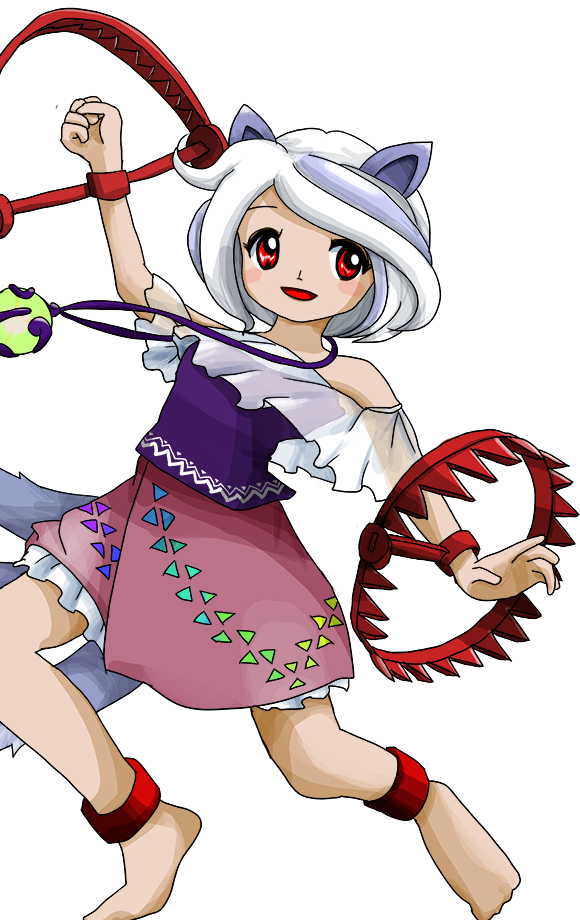
Enoko gets the least coverage here, because there really isn’t much to say. Yamainu, “mountain dog”, isn’t really a supernatural creature, it’s an old term for either the extinct Japanese wolf, a type of feral dog, or a hybrid between these. It can also be used as a synonym of okuri-inu, a youkai wolf believed to accompany travelers at night.
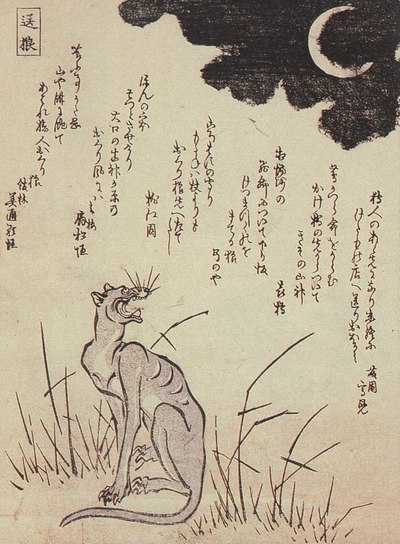
There’s actually a distinctly Journey to the West-esque component to Enoko’s backstory, but I have no clue if this is intentional. In the aforementioned novel, many of the antagonists, who are generally demonic animals, are motivated by the desire to devour the flesh of the protagonist, the Buddhist monk Tang Sanzang, because it is said to grant immortality. Granted, given the obscurity of the figure Zanmu is based on - more on that later - perhaps this is an allusion to something else we have yet to uncover. Cerberus, being probably one of the most famous mythical monsters in the world, does not really need to be discussed here. The illustration is included mostly because I like Edmund Dulac and any opportunity is suitable for sharing his illustrations. I do not think it needs to be pointed out that Enoko's bear trap weapons are meant to evoke Cerberus' extra heads.
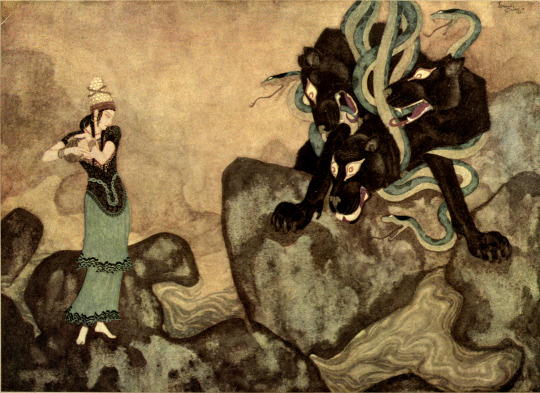
3. Chiyari Tenkajin - tenkaijin (+ mujina) + chupacabra
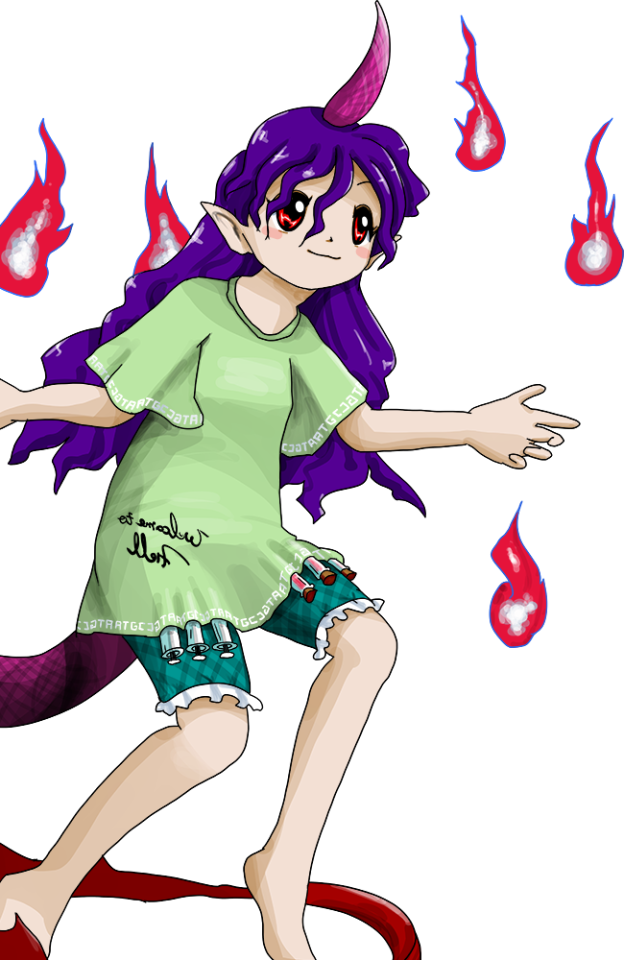
While my favorite animal youkai not yet featured in Touhou is easily the kawauso (otter), I was very pleased to learn we sort of got a mujina since I wanted to cover this topic since forever, but never got much of a chance. Technically Chiyari is actually meant to be a tenkaijin, which is not a mujina but a slightly different youkai (a will-o-wisp or St. Elmo’s fire-like creature, specifically) who in the single tale dealing with it takes the form of a mujina after dying, but as there is not much to say about it beyond that you will get a crash course in mujina folklore instead.

Today the word mujina is pretty firmly a synonym of anaguma - in other words, the Japanese badger. The animal does not substantially differ from other badgers, so I do not think much needs to be said about its ecology. However, historically the term could be used to refer to the tanuki regionally, or interchangeably to both animals, so in some cases if insufficient detail is provided it is hard to tell which one is meant. This ambiguity extends to the folklore surrounding them, and generally if you know what to expect from tanuki tales, which I’m sure most people reading this do, you will instantly recognize many of the plot elements typical for mujina ones. In other words, it is yet another yokai which typically takes the role of a shapeshifting trickster. Some supernatural phenomena could be basically interchangeably attributed to mujina, tanuki, kitsune or kawauso. Mujina are commonly described taking the form of Buddhist monks, which is one of the many similarities between them and tanuki.
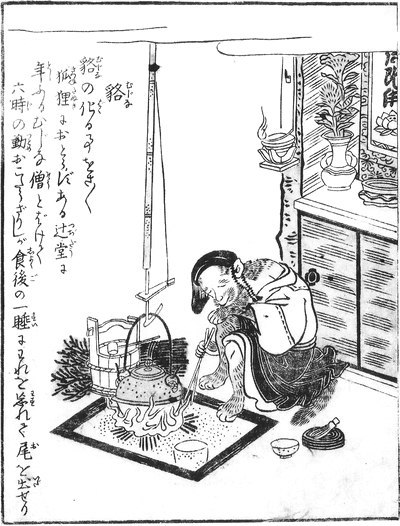
The most famous depiction of a shapeshifting mujina comes from Toriyama Sekien’s Konjaku Gazu Zoku Hyakki (The Illustrated One Hundred Demons from the Present and the Past). The accompanying text compares the creature to the supernatural versions of kitsune and tanuki, and states that the artist relied on a tale according to which a mujina was able to successfully impersonate a Buddhist monk until accidentally revealing its tail.
What makes the mujina special is that it is actually the oldest recorded example of a youkai of this sort. A mujina tale already appears in the early Japanese chronicle Nihon Shoki, dated to 627. It reports an incident of a mujina transforming into a human and singing somewhere in the Michinoku Province. I feel like this alone is a good example of why you should be wary of people who seek to present Nihon Shoki or Kojiki as historical truth. Western audiences as far as I know were first introduced to mujina by Lafcadio Hearn. To my best knowledge, the fabulous shapeshifting badgers however failed to gain the popcultural recognition enjoyed by tanuki and kitsune. They did appear in Shigeru Mizuki's stories every now and then, and I found a mascot character based on them, but overall there isn't all that much beyond that.
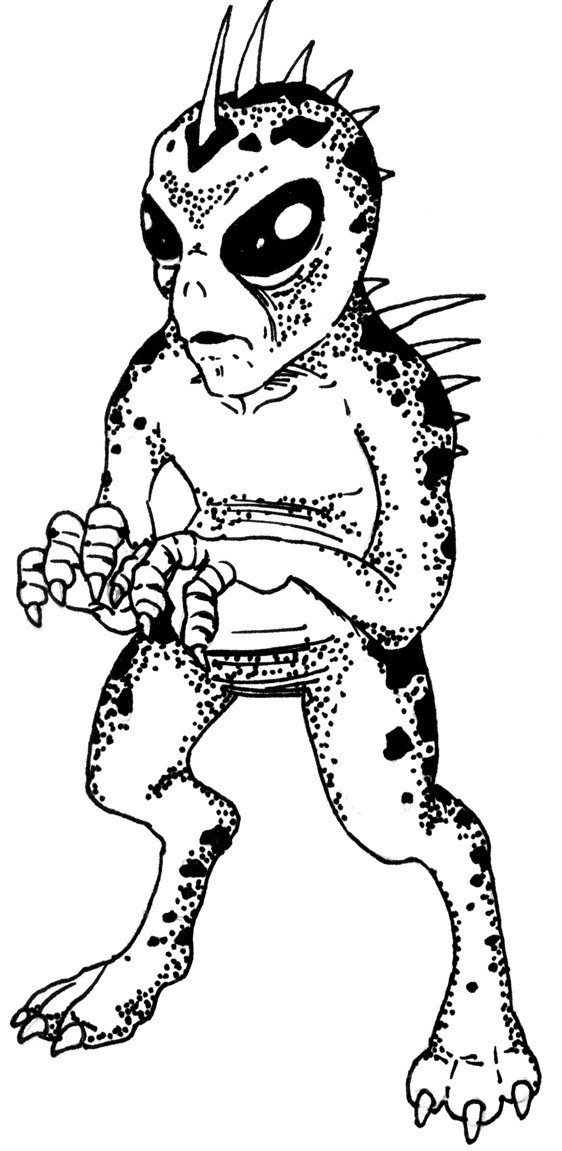
Naturally, there isn't much mujina in Chiyari's design, and she instead most likely owes her distinctly spiky appearance to the other inspiration behind her character, the chupacabra. Mujina are not really portrayed as bloodthirsty, but the poorly documented tenkajin apparently is, which is presumably why ZUN decided to connect Chiyari with the chupacabra, the best known modern blood-drinking creature, who first appeared in tall tales from 1995 and subsequently took popculture by storm after spreading from Puerto Rico to mainland USA and Mexico. I am not a chupacabra aficionado so I have little to offer here, sadly.
4. Hisami Yomotsu - yomotsu-shikome
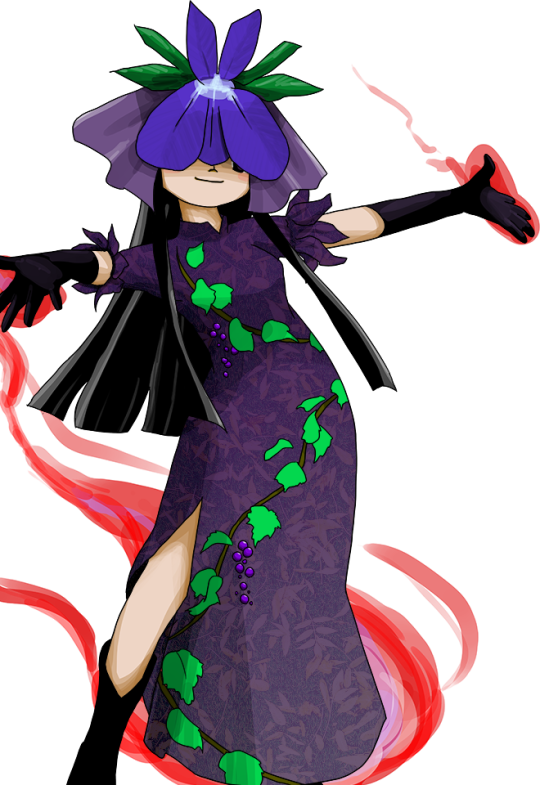
Judging from what I’ve seen on social media and on pixiv, Hisami is shaping up to be one of the most popular new characters (she’s my fave too). In sharp contrast with that, her basis is pretty obscure. So obscure that there isn’t even any historical art to showcase, as far as I can tell (note that this blog claims night parade scrolls might have something to offer, though - I was unable to verify this claim for now, sadly). As we learn from her bio, she is supposed to be a yomotsu-shikome. They’re called the “hags of Yomi” of Yomi in Donald L. Philippi’s Kojiki translation. The term shikome can be literally translated as “ugly woman”. Nothing about them really implies femme fatale leanings we are evidently seeing in Touhou but I’m not going to complain about that. Yomotsu-shikome appear only in the Kojiki and the Nihon Shoki, and in both of these early chronicles they are portrayed as servants of Izanami after she died and came to reside in Yomi, the land of the dead. Nihon Shoki states there are only eight of them. The distinct grape vine motif present on Hisami’s clothes seems like an obvious reference to Izanagi’s escape from Yomi following his meeting with Izanami, portrayed in the myth recorded in both of these sources. When the yomotsu-shikome started to pursue him, he threw a vine he used to hold his hair at them. The plant instantly bore fruit, which the entities started to eat. They later resumed the chase, but were once again held back, this time by a bamboo shot. According to the Nihon Shoki, they eventually give up after he creates a river from his piss (sic) to keep them away.
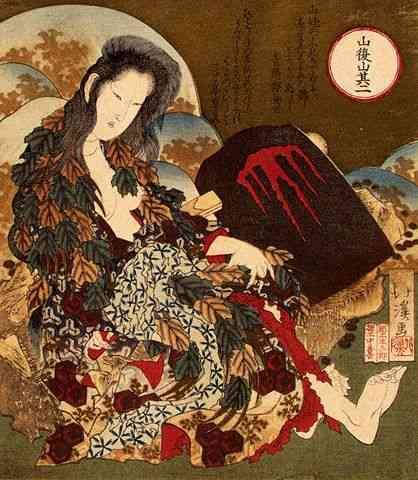
Yomotsu-shikome are sometimes compared to oni by modern researchers. Noriko T. Reider in her monograph about oni argues that alongside hashihime and yamanba (pictured above) they can be effectively grouped with them. Another researcher, Michael D. Foster, is more cautious, and states that despite clear similarities it’s best to avoid conflating oni-like female demons with female oni proper, especially since the latter have a distinct iconography and a distinct set of traits. Norinaga Motoori, the founder of kokugaku or “national learning”, a nationalist intellectual movement in Edo and Meiji period Japan, claimed that oni were based on yomotsu-shikome, which is a pretty dubious claim. It is ultimately not certain when the term oni started to be used, but it is safe to say it has continental origin. And, of course, oni permeate Japanese culture in a way yomotsu-shikome do not.
5. Zanmu Nippaku - Zanmu
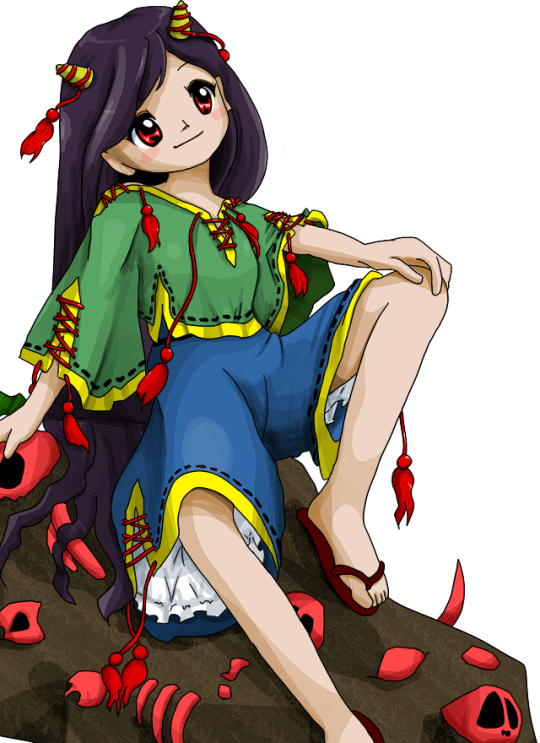
This was the toughest mystery to solve, and I am fully indebted to 9 here, since they figured it out, I am merely depending on what they directed me to. Research is still ongoing, and it feels like we just started to untangle this mystery, so you can safely expect further updates. Zanmu appears to be based on the Buddhist monk… well, Zanmu. You can learn a bit about him here or on Japanese wikipedia; it seems there are quite literally 0 sources pertaining to him in English, and even in Japanese there is actually very little. Their names are not written the same, ZUN swapped the sign for “dream” from the original name for one which can be read as “nothingness”. If the unsourced quote on wikipedia is genuine, the reason might be tied to the personal views of the irl Zanmu. What little we’ve been able to gather about him is that he was active in the Sengoku period, and apparently was regarded as unorthodox and eccentric. This lines up with Zanmu’s omake bio pretty well. Seems the real Zanmu was also unusually long lived, and was able to recall events from distant past in great detail, though obviously the figure of 139 years attributed to him in a few places online has to be an exaggeration.
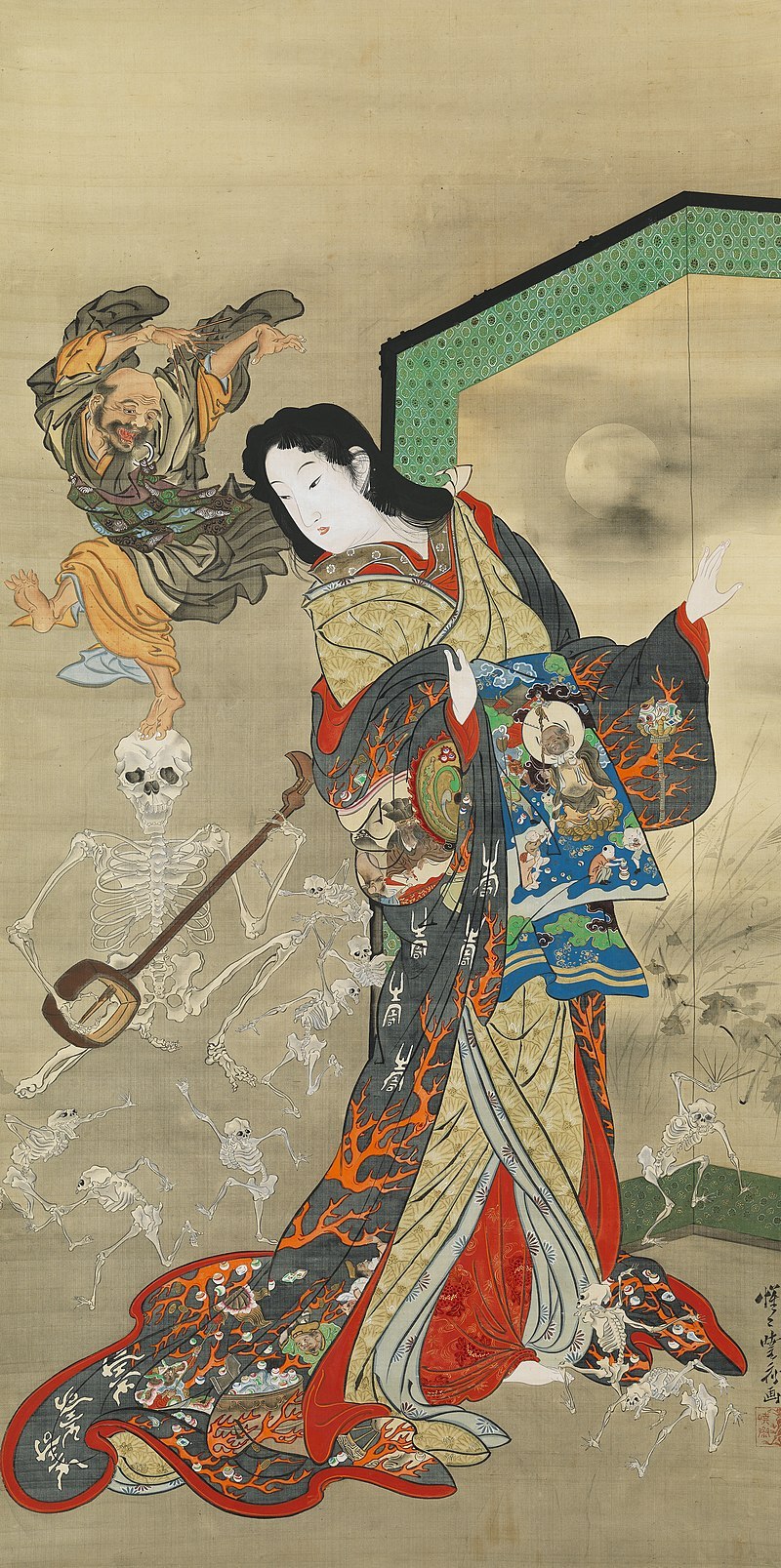
Yet more puzzling is the reference to Zanmu’s familiarity with Ikkyo you might spot in the linked article. Whether the famous Ikkyo who you may know from the tale of Jigoku Dayu is meant is difficult to determine. The chronology does not really add up; on the other hand the logic behind associating one eccentric semi-legendary monk with another in later legends isn’t particularly convoluted. As 9 pointed out to me, if ZUN was aware of this link, and the same Ikkyo really was meant, it is not impossible the connection between Zanmu and Hisami is meant to in some way mirror that between Ikkyo and Jigoku Dayu. As you can easily notice, it’s pretty clear the historical Zanmu was male. It does not seem his Touhou counterpart is, obviously. I would say we should wait for more info until declaring that we have a second Miko situation on our hands, with a male historical figure directly reimagined as a female character without any indication we are dealing with a relative rather than the real deal. There’s still relatively little info to go by so I would remain cautious (though naturally this is not meant to discourage you from having headcanons).
Neither me nor 9 were able to find any connection between the historical Zanmu and oni… so far, at least. Therefore, what motivated ZUN to make Zanmu an oni remains to be discovered. As a final curiosity, on a semi-related note it might be worth pointing out that while not as common as their male peers, female oni are not a modern invention, and already appear in setsuwa from the 13th century. A particularly common motif are tales describing a woman turning into oni due to jealousy or anger. Further reading:
Jason Colavito, The Secret Prehistory of El Chupacabra (2011)
Bernard Faure, Gods of Medieval Japan vol. 1-3 (2015-2022)
Michael Daniel Foster, The Book of Yokai. Mysterious Creatures of Japanese Folklore (2015)
John Knight, Waiting for Wolves in Japan. An Anthropological Study of People-wildlife Relations (2003)
Noriko T. Reider, Japanese Demon Lore (2010)
279 notes
·
View notes
Text
i think criticism of lyse's design is extremely valid. i think if she looked more like basically every other ala mhigan (brown) a lot of the wrinkles around her stormblood character* would get ironed out. however i do think that she is overly criticized. gamers hate when a woman has an arc where she grows and learns.
lyse's story is one of diaspora, and returning to her homeland and having to learn about how people live under occupation and how to work with that. there's a reason she is paired with hien (lived under the empire, helped lead a failed rebellion, and then fled into exile) and fordola (lived under the empire, doesnt know a free ala mhigo, is a depiction of how imperialism steals away a people's future (their youths) and chews them up in its machine to further crush resistance). she is both an outsider who asks questions to be a vehicle/companion protag for our wol to learn more about ala mhigo, and provides someone who is very emotionally invested in its struggle for freedom. contrast to heavensward: the person most emotionally invested in their own people is ysayle. estinien seems very mercenary and gruff and is mostly invested in his hatred of nidhogg, aymeric is a cool-headed politician who's trying to do what's right but also politically possible (aymeric the #bluewave), and haurchefant is pretty absent for a lot of the plot and is mostly invested in the wol. nobody is as passionate about ishgard as lyse is about ala mhigo (this is my perception, YMMV, etc, i am notably rather lukewarm on hvw). the point of lyse is that she must learn about the homeland she was ripped away from and still desperately wants to help. and to learn about something, you have to start out with a lack of knowledge. you know. like a character arc.
also i feel that people often misremember lyse's job. she is not the leader of ala mhigo. that's more raubahn's job. lyse became the leader of one specific cell of the ala mhigan resistance, of which there were many. she now has a position in their armed forces. we see her a lot when ala mhigo comes up in msq because 1. we are almost always with the scions and she is obviously gonna be ala mhigo's scion liasion 2. she is the character most strongly associated with ala mhigo so of course the writers are gonna use her for that. but while she is influential in the government she does not run it. also - lyse has experience as an anti-imperial activist! she was involved in multiple castrum infiltrations and both of the empire's massive defeats on the eorzean front! she's a scion, she has experience!
i have other thoughts but it is late. obviously not loving lyse doesn't make you a misogynist. i don't even feel very passionately about her, i think she's fine. i am talking more about macro-level fandom trends than accusing you the reader of being a gamergate mra. i also think that there's a lot of unpacked misogyny in all our heads that we need to deal with, and if that part of that means stepping back and giving female characters more grace and putting some mental energy into actively understanding/analyzing them, then all the better.
*i do realize that part of the issue was that they were stuck with her 1.0 design of a blonde white girl on a middy model (since f highlanders didnt exist for a while). perhaps there is a universe where her dropping the archon mark glamour changes a lot more about her appearance, and that lyse had a few different phenotypes than her sister - but i am not qualified to say whether this would be better or worse. there would be some interesting discussions on it, though.
20 notes
·
View notes
Text
Starting a 13th Doc rewatch in honor of sunclair so i can write it accurately since ive only ever seen it all once. i will be obnoxiously high (because why not) one post per episode i think?? sorted by reblogs? that seems like a plan. hopefully 3 a day. as a prerequisite ; my opinion of the 13th doctor is essentially '10th doctor but more color' and i do generally think i like her more than 10. dan > ryan > graham > yaz - its nothing against yaz its entirely chibnall just being really solid at writing endearing old men; its his biggest writing strength. we shall see if any of this changes with the rewatch :) I write a lot. sorry in advance on the length
With that, onto The Woman Who Fell To Earth !
yall can never make me hate ryan the intro is actually so good
i, personally, do not think doctor who should look that pretty. the sky should not be that crisp i feel like i am looking at a microsoft computer picture thing. too pristine. but objectively absolutely stunning absolutely gorgeous. between the framing and the lighting and the color grade and how it looks on the costumes - the show looks very nice.
dynamics!! character building is already off to a great start and it was unpaused for like 3 seconds. also the way it cuts to the other shots - that was very pretty. again very film. but objectively very pretty.
i should note here that i should have done some homework and watched the 5th doctor era before this - for some reason i have an idea that it must be chibnalls biggest classic inspiration but ive never seen it so i cant provide citations for that. but its likely a thing i'll say as it goes on
lol just tosses the bike now okay - very nice characterization. but i myself am stuck worried thats gonna whack somebody on the way down
also like techincally is them siting on the rocks not considered character building like theyre all fucking crazy adventurous people. like adore them but omg thats scary as hell and theyre just chillin - perfect for the doctor !
well thats a completely different forest.
that is such a torchwood style moment and honestly there is a bit of a torchwood feel to all of 13s era and i do really enjoy that.
now i am american so i must say yaz's uniform looks utterly fake because in my mind the real one is the welsh one from torchwood. i know its a country or more specific of a difference. but the welsh one is the real one to me.
i know theres dicourse about the yaz of it all here. i dont remember what it is though. so ill say - im reading this as yaz first handling the thing, while also like very much having to fake the confidence in order to do it. like shes not comfy in it yet, but she can and she will. and then secondly her boss being a bit of prick. but like hes a cop why would i be mad about them having a cop act like a cop (a prick). idk.
ryan is incredibly funny and charismatic in this scene, yaz is less so but thats also a character point again its giving awkward and im enjoying that from her. also they both kinda go flat when they realize they know each other - so im fairly certain that was an intentional character choice as well. theyre like, acting like its a reunion. very natural to reality.
oh i strongly disliked the camera placement on that scene though
train! okay now the perfection of the shot looks better now because there enough shadow to make up for the lack of pixel lines. contrast is apparently a skill not being taught
disappointed in graham but we certainly are learning about the two of them and their personalities. in action no less!
lol not graham being immediately then whacked by the most possibly violent crash in the circumstances
well that just got absolutely horrifying maybe they are teaching contrast i see the plan now
alright - the music is very different. its not bad. its actually really good. its just really different. i feel as though im watching a 2015 creepypasta video. like i associate it with the deepest parts of fictional fear, but its also like, doctor who and the start of the episode so its almost out of place. although it is very torchwood!
lightning worms? i dont remember the villain being lightning worms
omg jodi looks so good wtf i forgot how good she looked in this ep why didnt we keep this wig
i cannot see. what is going on with this section
i love her "stay put" girlie you just showed up why would they do that also i think she just fully assumed they were already her companions there - 12 regenerated to clara and strax after all.
very monologue but practical and i think it works and ads that always begged for by fandom aspect of 'domesticness' assuming i even understand it (not sure i do i just see people complaining about its lack all the time idk what theyre on about tbh)
i love how like almost planned the doctor is. its like beat by beat performative its perfect. just the right amount of dramatic flair
if this is the only episode her bottom lashes have mascara then a fashion crime has been committed
chat im trying to be casual here but im actually in love with jodi whittaker wtf i forgot how much i did just love her embodying the character. like this outfit why couldnt we keep the coattttt
lolll they think shes absolutely bonkers i love it shes adorable
shes such a goof 'can we have the lights and sirens' babes what do you think ?
not doctor brain then translating for everyone else frankly thats improvement !! we love to see little growth moments between doctors. internalize those clara cards!
not the lesson on the importance of community hes trying to do the thing hes trying
shes literally glowing <3
'yeah i guess so' how can you NOT like ryan oh wait his poor phone
YOURE ALL MEAN TO THE GOOFBALL FOR WHY. BE NICE TO THE GOOFBALL. omg ryan get behind me ur getting the wally treatment welcome to the team
graham what the fuck not you too
TINKER FAIRY DOCTOR TINKER FAIRY DOCTOR
i love the doctor speech paired up with set dressings fitting for a serial killer lair. thats a beautiful touch
lol its actually so funny to think about earth being a proxy war location given how many proxy wars we have like honestly yeah uk or the us should kinda bear the brunt of those (obvs none actually should but its fiction guys its called ~dramatic irony~)
so sincerely what foundation is jodi wearing in this its amazing
the drunk guy was so unnecessary and yet also so funny
like the camera shouldnt be sooo good that i can clearly tell styrofoam when i see it. poor costume departments everywhere yall deserve better conditions (joking guys it just makes it annoying and difficult its not like a full on work hazard i know)
im gonna need some good fic recommendations i think. i kinda forgot how susceptible i am to big eyes as if thats not like the defining characteristic of my type omg the doctor absorbed clara's tricks
ooooh its a game i wonder if itll tie into any of the stuff from this season somehow/eventually idk just seeing the double game of it all
im so so sorry guys she just looks so much like kate beckett and i just realized this and now i also am thinking about her and now im just very distracted im certain the plot is plotting along but outside of the tim ice blue guy being a cheating loser theres not much plot going on for me to miss
talks a big game but then just lets them have it doctor why are you like this
this is why you be careful. because he is special. he is valued. because he is the trophy. for an alien species. be careful out there/j
every character death will be humanized. im noticing that is a recurring thing
i do think they were going for leaving the options open for a ryan yaz something and omg am i glad they did not but this part does feel like it was specifically for the just in case they did
ngl i hate the crane of it all. interesting for like a writing prompt but i do not enjoy it i dont think
you know i have some thoughts on graham right now and they arent good one
youtubing how to crane omg ryan the icon
okay i take it back jodi looks hot as hell on the crane its all worth it for that shot wow
this guy is honestly quite adorable ; reminds me of whittaker from the pitt funnily enough. sad hes probs gonna die
fucking ridiculous the doctor is what the fuck why are we doing crane parkour
yeah now you know how some of the companions felt doctor you do a lot of running and youre usually very tall
im not gonna talk about the one thing. im just not. i dont know. i just sad.
'sorting out fair play in the universe' awwww and then the giggle thats kinda cute actually a nice little thru line
so im not gonna talk about that either i have no postable thoughts about that its certainly organic looking
oh the sad is now well thats rude the music is very good that was icky i am tearing up
can someone please give ryan a hug omg
still wanna have a really long chat with the costume dept . why did we land on that , exactly?
also the best part of that is the earrings and i dont even think they kept those
not kicking them out to space omg silly ass cliffhanger
okay that took me three hours and i really enjoyed it and i held back on commentary omg that was kinda a mess on my end but on the whole 8.5 i think, really solid episode. i'll do more tomorrow :)
#doctor who rewatch#13th doctor#the woman who fell to earth#yazmin khan#ryan sinclair#doctor who#if you're nice i'll do this with 10 after and maybe even grow to like him i havent rewatched his properly either
8 notes
·
View notes
Text
the case for hyper-femme hotspur
this is my tumblr blog and this is like kind of just what we do heresies
OK so basically okay so
first of all i think anytime there is a character who is so strongly associated with an extreme form of gender expression in our collective zeitgeist (i.e hotspur and hyper-masculinity) there’s something not only extremely fun to play with but incredibly valuable about analyzing the story from the opposite end of the gender performance specturm. also canonically there are like 3 female characters in 1h4 and that sucks. also also don’t you want to see hotspur in pink glitter? i know i do and this tumblr is not a democracy!!
in this hypothetical dream sparkly version of the play, both hotspur and worcester would be women. not played by women, i mean textually explicitly women. this is important!!
worcester should be very nancy pelosi hillary clinton-esque in the way that this is a middle-aged woman who has been taught that to be successful in her field (politics) she will have to strip herself of most of her femininity and perform a certain level of masculinity in order to be taken seriously. this creates a whole other layer to the hotspur/worcester dynamic when all of a sudden this young, hyper-feminine woman is being taken more seriously and being given more praise than someone who has worked and fought through the bullshit and done it all “right”. she hasn’t earned her place, she hasn’t had to struggle - and worcester resents her for that. (there’s like a whole dissertation to be written about how much of 1h4 changes when only worcester is genderbent, i love you queen worcester you are everything not in this version here you kind of suck lowkey)
henry iv is just a misogynist he just kinda sucks but like this is something we all knew screw that guy
ok now we can talk about hal because i know hes like the one all you little gay people care about.
to me, it’s never made sense why the Henriad is framed as hal’s hero’s journey. maybe it’s because i’m queer (i’m like actually positive that’s why), but leaving home and finding acceptance and family from a group of outsiders who society has deemed as worthless is the path i’ve watched so many friends walk. having to leave that and return to your shitty dad because “duty calls!” and THEN leaving behind and disavowing the same community that opened its arms to you? i don’t see that as an awesome coming-of-age about learning how to handle responsibility, that’s deeply, deeply tragic. and far farrrrr too true a reality for most members of our LGBTQ+ community here (Bible Belt). SO guess where this version of 1h4 is set!!!!!! anyways, its the Medieval Revival of the ‘70s in the Bible Belt south, the Boar’s Head is a gay bar, and hal is trans.
hal is trans-masc in some way and this needs to be incredibly explicit (like pronouns pin with trans flag on costume explicit). and then when the news breaks, when “I’ll to the court in the morning.” (we’re cutting the text so this is where that scene ends. cool? cool. cool!), hal takes the pin off. it needs to be like A Moment. it should make me cry, and i cry really easily so that’ll probably be pretty easy to do, but this is a gut punch.
oh and lady percy is still a woman, they’re gay, because i said so. blah blah blah because look hotspur and hal really were so alike all along and look hotspur is fighting so voraciously because she’s hungry for a world where she can openly and unabashedly be with the person she loves but ultimately because i love lady percy and i love lesbians and this play doesn’t need another man. but also because look hotspur is fighting so voraciously because she’s hungry for a world where she can openly and unabashedly be with the person she loves. worcester and vernon should also both be women and have the blossoming of a relationship but be a lot more discreet about it (worcester should be extremely hesitant). now we get a cool split between younger and older generations of activists in both the feminist and the gay rights movement oooo themes oooo motifs oooo lady gagita
as far as hal/hotspur parallels go, it’s probably pretty obvious at this point. your dad constantly praising someone who represents, at least in his mind, the ideal concept of a woman, disappointed you can’t be more like her, all the while you’re coming to terms with the fact that you’re not a woman, but he’ll never see that, so what the fuck are you supposed to do?!? it’s a LOT! but i think there’s also something to be said about the less obvious parallel. which is that hyper-femininity is NOT an attempt at ideal polite womanhood or self-Stepfordization, hyper-femininity is in fact the extreme performance of womanhood in rejection of that. hyper-femininity is queer in nature (also hotspur quite literally has a wife but i guess hal wouldn’t be able to tell that just by looking at her) there’s something to be said about the moment hal and hotspur see each other, and then the moment hal and hotspur seeeeeee each other. and go hey, you’re just like me. this person who you’ve been constantly compared to and made out to be lesser than because you dare to be deeply wildly madly truly you is in fact exactly the same. we’re the same. and oh my god, in another world wouldn’t it have been lovely to just like go dancing together? sucks it’s not another world now we’re going to gay fight each other i guess
#also thinking about the line “Thou speak'st as if I would deny my name” in this context#my dream version of 1h4 has a lot of cuts/mix and match line reassigments#but that felt like A LOT to get in to#and frankly after a six show week with two PR engagements a girl is TIRED!!!#i hope you liked this i hope it made sense!! im going to go do my hair for the second of those aforementioned PR engagements now by interne#1h4#henriad#shakespeare#henry iv 1#shameless self plug if you like this you should read my play mwahahhaahahaha!!!!#ambomsaqbime#a merry band of misfits save a queer bar in medieval england#henry iv part 1
23 notes
·
View notes
Text
Controversial take but. Fnaf is the closest we have gotten to 2010s/2020s equvalient of Bionicle. Yes, even more than Hero Factory, Ninjago, Chima, Lego Monkie Kid, Rebel Nature, Greg Farshtey's "Legacy", Xenoblade Chronicles, that one indie adventure game inspired by Bionicle, Ascending Depths and all those Afterman spiritual successors Bionicle fans have tried to make in the past few years. Yes, even more than those obscure cult classic JRPGs I have compared Bionicle to in the past.
Because Bionicle and Fnaf both:
Started relatively simple with a strongly effective unique premise at the center before gradually expanding into a sprawling narrative
Caught the audiences attention by presenting a captivating mystery from the get go that drove curiosity and intrigue
Because of the above, the community is heavily based on theorycrafting and speculation, with many fans trying to figure out the mystery of the story.
Are surprisingly storydriven in mediums/genres generally not associated with stories
Became popular overnight, creating a sort of cultural zeitgeist
Were a last-ditch effort by their creators who at time were struggling financically (Bioncle was released at the height of Legos dark/dork era, while Fnaf was Scott Cawthons last attempt at making a game before opting out of the industry)
Have (one of) their creator be relatively actively engaged with the community, interacting with the fans much to their fans amusement and frustration.
Pretty much were among the fiction that popularized the "lore" as a concept.
Get retconned and coursecorrected to hell and back, but not to the extent fans may think.
Experienced gradual tonal and genre-shift from one genre with scifi elements to more full on scifi.
As years went on, the unique appeal of the series (tropical island high fantasy for Bionicle, horror for Fnaf) were diluted because of aforementioned genre-shift to the point some people hate the later era and vastly prefer the earlier years.
In addition the mystery elements were diluted either answering everything or by complicating the story.
Heavily rely their storytelling on supplemental material on their later years, especially books.
Cryptic and vague at times to the point of frustrating
Have a main villain whose portrayal changed from simple to more complicated mastermind. Both main villains also had initially their name hidden, before their true name was revealed later on.
In spite of having its appeal be in its robot-characters, plotdriven instead of character driven
Also gradually drove away from the characters center of the appeal (Toa/the main four animatronics) to those who were involved in the origins of the story.
Had a satisfying ending (Journeys End/Pizza Sim), but still continued past that, including elements that the fans hate.
These post ending content had the main antagonist be a deeply lore-important impersonator who made the lore more complicated than it should be (Velika/Mimic)
Have a pseudo soft reboot people have...very mixed to negative feelings on (Bara Magna for Bionicle, Steel Wool era for Fnaf)
Have a fictional element act as a central mcguffin of the story (Protodermis and Remnant/Agony respectively) which is frustratingly vague and poorly explained.
Have a rather dedicated transformative fandom who make new additions to the larger mythos, or expand on the pre-existing lore. The creators actively support this, and have even endorsed fancreations or made some fan-elements official.
The creators simutaneously plan everything ahead and are a hack. At the same time
There are probably more but those are the ones I think of at the top of my head
23 notes
·
View notes
Text
i guess music and fictional characters is becoming my thing.
one of my strongest opinions is that eddie diaz would be a sza fan, so much so that i have a playlist titled “eddie diaz but it’s just sza.”
of all the songs i strongly associate with him, i think there is one i can confidently crown THE eddie diaz song. and i feel so strongly about this that im going to share a breakdown of why.
that song is
‘no more hiding’ off of LANA (or SOS deluxe, or however you prefer to refer to it. )
this holds especially true when you take s7-8 into account.
[verse one]
no more hiding
i wanna feel sun on my skin
even if it burns or blinds me
i wanna be purified within
analysis: the greatest thing about this song if you read it as relating to eddie diaz is how multifaceted each line is in that context. the opening is already a great example of this. “i wanna feel sun on my skin,” in its original context can be assumed to be a metaphor for stepping into the truth/one’s own truth/one’s true identity, which is already applicable to eddie. BUT, you could also interpret that line to be about the sun as in buck (sunshine princess.) either way, i like that it serves both purposes because one is inward (self acceptance, a huge theme for eddie) and one is outward (receiver of his affection.) also i love the use of the word purified when applied to eddie, almost a reclamation of sorts. purified has a very religious connotation imo, and i like the idea of him creating his own definition of it untied from christianity.
[verse one cont.]
no more hiding
i wanna be in love for real though
don′t care what it costs me
i’ll trade anything to feel now
analysis: this is where we see one of the reasons sza as a narrator doesn’t want to hide anymore. she’s realized hiding from her true self closes her off from meaningful and fulfilling connection (specifically romantic.) this is something i believe we are in the process of watching eddie realize/something we’ve BEEN watching him realize.
[chorus]
searching for real, trying for real
familying for real, lost in the real
hurting for real, chasing a real
anything real
analysis: i don’t even know what to say about this one, it feels so self explanatory. “FAMILYING for real” after he dadded up in last nights episode (8x13 as of 04/04/2025) makes this specifically applicable.
(also personally love the use of the word ‘anything’ here seeing as that’s another sza track i relate to him.)
[hook]
don′t gotta say it 'cause i already know, mm
don't gotta say it ′cause i already know
everything i love, i gotta let go
gotta break it if you want it to grow
had to build everything twice over
don′t tell me 'cause i know
analysis: again, this one feels self explanatory, especially with everything i’ve already written above.
[verse two]
no more hiding
i wanna be real me, ugly
no more fake me fighting
i wanna know what′s underneath, oh
mask off
i get more oversized down talkin' face off
cut myself open to see what i’m made of
i guess i’m guilty of giving out fake love
i’m so fake, fuck
analysis: there’s a lot here. first off, the line ‘no more fake me fighting,’ is so interesting when applied to eddie diaz because it can be taken literally. one of the periods of his life that he was hiding from himself the most he was LITERALLY using fighting, physical actual fighting, as a coping mechanism. the thing that really sells this verse as being eddie-coded is its delivery, typed out lyrics aren’t going to do it justice. it’s the frustration that comes with breaking free, you can hear the turmoil in sza’s tone. it’s worth it, but it’s a struggle.
my point being, i highly highly recommend giving this song a listen with eddie diaz in mind.
13 notes
·
View notes
Text
Murder Drones: Sic 'em
WARNING: This essay discusses the darker side of dog ownership, as well as manipulation and emotional abuse. Please take care.
In the 1890s, Karl Friedrich Louis Dobermann had a problem. He was the taxman for his town in Germany, which often meant he carried large sums of money. This made him a prime target for robbery, nevermind getting beat up while trying to gather taxes. Karl was also a dog catcher and he saw a solution to his problem in his second job. Karl bred together the most aggressive dogs he had caught, with the goal of a dog that was untouchable by anyone other than its owner and was quick to bite. Thus was born the Dobermann Pincher, a breed made to guard its owner. The breed was further developed after Karl's death to give it its present appearance. The Dobermann Pincher needs early and good training because of their very sharp nature. Though it is no longer used as a military or police dog, the Dobermann ideally should be willing to attack on command.
Like a certain murder drone.
I recalled the story of the Dobermann Pincher to showcase exactly the lengths dogs are willing to go when their owner gives a command. And how this loyalty has been used. N from Murder Drones is strongly associated with dogs. Though the breed the show focuses on is the Golden Retriever, it needs to be noted N isn't a very good retriever.
Rather, he is a hunting dog released from its leash to catch its prey. Something he felt pride in before Uzi convinced him otherwise. N's loyalty towards his friends and allies is both his strength and his weakness. On the positive side, N is willing to go to any length to protect his friends and family. On the negative, this means he will trust his friends and family to have his best interests at heart. Something that was abused by Cyn/the Absolute Solver for its own ends. N's nature as an attack dog was further aided by the memory wipes he faced. Because N was in the dark for most of his time as a Disassembler, he only had the context of his job and that he had to do it. Which, like a good boy he is, he did. When Uzi brought the idea of rebellion to N, it wasn't just the idea of questioning the company. It was also telling N to think on his own about whether he should attack or not. It takes N a bit to internalize this; after all, he spent years doing as he was told. This is especially ironic since N has a good moral compass. He has an idea of right and wrong. But because of his trust in those holding his leash, he'd trust they knew better than he did.
Part of N's arc as a character is to stop looking at others for confirmation and find it in himself. This includes Uzi. It is a small moment, but it stood out to me when I watched the Pilot for the first time. After all Uzi told N about rebelling and finding respect, what does she do when N tries to be friendly with her father? She smacks him and tells him to shut up. The implication is that Uzi could have easily become another J to N, had the story gone differently. When N takes out 'Tessa', he is deciding that he cannot continue being the good dog. Golden Retrievers have soft mouths, sure, but N is not a Golden Retriever. He needs his teeth, if for nothing else than to defend his own choices from a world that was more than willing to erase his autonomy. In the end, N learns to respect his own choices. He no longer needs the leash and sees it as the trap it was.
11 notes
·
View notes
Note
so thoughts on kaiser's... can't stand white drinks sentence?
Hi anon! Sorry for the late response
Ignoring possible ordinary lactose intolerance and my fractured by the "Kaiser and Ness, Ness and Kaiser" psyche, I'm betting on the…
Church. Take me to the church
(just in case - I'm an atheist and very poorly educated about religions, so I apologize if there are any inaccuracies here)
First of all, why would Kaiser be connected to religion? In addition to @echari3 stunning post here, where she draws some amazing parallels we have:
Kaiser's name itself is "Michael, God-given."
White is a color traditionally associated with Christianity, churches, praying, and faith;
The Bible is directly related to obedience.
Also? The Bible and the scriptures themselves are associated with milk.
Highlighting the main point from several articles I've read, the Bible is associated with milk both directly (in the religious scriptures) and indirectly consistently declaring the following (you can read the quotes from the Bible and scriptures here, and I'll just summarize below):
According to the Bible, one who is fed with milk is undeveloped and weak;
"I had to feed you with milk, not with solid food, because you weren't ready for anything stronger. And you still aren't ready," - Letters of Paul to the Corinthians 3:2;
A baby does not eat bread, a baby does not eat meat, a baby does not eat anything at all but milk. And the Bible associates man with the baby, whom it teaches its dogmas;
And finally, we come to a conclusion:
Milk is the word of God. And believers who comprehend it are helpless infants.
And what could a man like Kaiser, who by his own words used to be a weak and easily submissive and surrendering person, hate the most?
Helplessness.
The Bible and religious writings teach in many ways precisely submission and humility. Don't take more than you need, give to everyone who asks of you and to the one who took yours, don't demand anything back, give the other cheek and so on.
And little Kaiser, who grew up in a very religious family (most likely obsessed with religion enough to even give him a name associating him with a god), couldn't have known any different. Children are easiest to control until they reach the age of transition - but once they do, they learn to think critically and question authority and the order of the house. If you follow my theory, then noticing this disobedience his family could have pressed on him even harder …
But Kaiser, with his incredibly strong character, did not obey, but instead resisted even more strongly - putting all of his rage, anger, and resentment into it.
You wanted me to be kind and merciful?
Then I will destroy.
You wanted me to be a god?
Then I will be the devil.
70 notes
·
View notes
Text

JJK verse: hidan as a ᴄᴜʀsᴇ.
while I value the idea of hidan making a possibly interesting ( and unhinged ) curse-user, I think it thematically makes more sense for him to be a curse(d spirit). I mean, not only has his whole character been entrapped and shaped by religious violence & trauma, but idk, maybe it’s just me….but I think that there’s something so very narratively appropriate about hidan becoming ( quite literally! ) the embodiment of everything he propagated / obsessed over in his canon ( i.e. religious zealotry to the point of lowkey insanity, and the pain associated with it, both to himself and to others ). it's poetic justice~
in a nutshell, the embodiment of the terror, hatred, despair, betrayal, conflict, and agony associated with religious discrimination and persecution perpetuated ( either willingly or by coercion ) by humans upon their own kind, for centuries upon centuries. religious persecution and its outcomes are strongly interwoven throughout human history and have caused an immeasurable amount of human suffering across cultures. assume an extrapolation of it into the jjk world — yeah, horrific stuff, and the associated reservoir of cursed energy is proportional to the horrors.
the unresolved pain of those being hunted, being tortured, being killed. the hunted and dehumanized in the name of a specific faith. the orphaned and the terrorized. the quivering voices pleading to a silent god. the hating eyes of the inquisitors and the trembling of the accusing finger of it's them, better them than having the blade turned upon me. the doubtful, silencing their doubts and strengthening their position by blood. the horror and disgust of the mute onlookers. perpetuator, idleman, victim; all of it, all of them.
brief physical description. 177 cm. humanoid (male). silver hair, magenta irises, overall similar in appearance to his canon curse form. in terms of garb, wears nondescript (black) monastic robes, which are often, but not always, paired with a takuhatsugasa ( a wide, bowl-shaped hat that partially obscures the wearer's face ). generally holds onto a long string of charred beads ( unclear if representing a rosary or mala beads ).
notable psychological characteristics. wrathful, vengeful, chaotic, hypocritical*, prejudiced, fanatical. somewhat unhinged. easily (albeit more often than not sadistically ) entertained/amused. can play surprisingly well with others, if he feels like it. ( if. if. )
* i have to put a special emphasis on this one because it's so, so important. Hidan will often play judge, jury, & executioner with someone, and bring upon them 'godly judgement' for their beliefs, morals, and behaviours, acting holier than thou and superior... only to behave in the same exact manner (thereby contradicting the very doctrine he supposedly seeks to 'uphold', while supposedly implementing its ideals; something something yeah, it's a not at all subtle & direct parallel / critique of some present-day happenstances. )
sidenote, but as a human-based curse ( of important note is that he isn’t a curse based on the fear of god; he really is a curse based on fear of the horrific actions perpetuated by humans in the name of a specific faith ), he has a particular interest in humans, and would happily interact with them, although if said interactions are positive or negative is tba ( he honestly doesn’t care, as long as they’re entertaining ). normal humans, sorcerers, curse-users... it doesn't really make much of a difference to him.
cursed techniques, grade, etc. tba on an as-needed basis. ( might be thread-dependent for funsies. )
#v: you are my special ( jjk ).#ABOUT.#( gently hands this to the dash: plz write with me in this verse. )#( this is all in a nutshell. i really could go on for pages.#but i am lazy so. these are the bare bones.#unless/until specifics are needed.#gold star to me for actually writing something about it ig. )
9 notes
·
View notes
Text
“I’m scared of you already, and I’m not even real.”
This quote from Brain Ghost Dirk never did get much follow-up, I think. Many of us certainly don’t think of Jake English as one of the scarier characters in Homestuck do we? One of the sillier ones maybe, or one of the more tragic ones.
So, for a change of pace I’m taking this opportunity to voice ideas about how Jake could be portrayed as someone to be respected and even feared in fanworks, someone who wields the kind of power that makes people think twice about getting into his bad books. And why not? The seeds for it are there, even if undeveloped. In canon alone we’ve seen him do the following at full power:
Destroy a sizeable section of Derse as angels coalesce out of the raw Hope he’s putting out uncontrollably
No-sell grimbark Jade’s Witch of Space / First Guardian powers
Make his mental image of Dirk real, complete with corny movie references the real Dirk would never use
(Possibly) copy Prince of Heart powers for said imaginary friend to use. [Inconclusive, might just be a Dirk-splinter thing.]
No-sell godtier Caliborn’s clockwork majyyks — the rainbow flashing aura so associated with god tier resurrections, mating cherubs, and especially Lord English
It isn’t much to go off of, but the sheer destructive power of Jake’s Hopesplosion, as well as how his power is able to hold its own with (and handily dunk on) the rawest energies associated with Space and Time themselves, seems to indicate there’s a wonderful, terrible, blazingly bright abyss at the core of the Page of Hope if you dig far down enough. The only catch seen so far is in how much control Jake had over his powers on both known occasions — none in the arc leading up to Game Over, and up for debate during the Masterpiece showdown against Caliborn. That only raises a question fanwork is free to explore: what happens when Jake finally gets a grip on this awe-inspiring power?
Post-canon furnishes something else interesting regarding Jake, in HS:BC’s second May 2024 upd8. In a fit of righteous rage where candy Jake finally gets to go off on candy Jane, he mentions that Tavvy Crocker has been free of his peanut allergy since he was 13, and the panel and pesterlog where he explains how it happened strongly suggests Jake’s desperate wish for his son to be cured of it came true. This is an unconscious use of his Aspect’s power just like the time he started glowing while dancing with candy John, but this one is long-lasting, and possibly permanent. Far from being mere illusion with solidity (as some might propose by citing Brain Ghost Dirk faltering in existence as Jake’s Hope field dissipated in the pre-Game Over arc), the implication is that Jake English has the potential to be a full-fledged reality warper just by believing hard enough in what he wants.
This is why I want to see the scope of Jake’s powers — the very potential that scared Brain Ghost Dirk months before Jake ever reached the godtiers — explored in fanwork. How does someone like Jake grapple with that kind of power, whether within his active grasp or eluding his reach in unconscious use?
Give me a Jake that has shades of Haruhi Suzumiya to him, able to change reality without him realizing it just by wanting something so hard that paradox space obliges.
Give me a Jake conscious and fearful of the danger he poses with his powers, fleeing into solitude on instinct because he’s scared of hurting others if he lashes out — because after all hasn’t he done it before? Couldn’t he do it again?
Give me a Jake who treats the awesome power of Hope as a godly nuclear deterrent, who keeps the peace on Earth C with the threat of unleashing all the terrible things his movie-and-comics-saturated imagination could conjure up.
Give me a Jake who revels in newfound nigh-unlimited power after so long feeling powerless, and who sets about remaking his corner of the world — or perhaps the entire world — in his image. And why not stop at just one planet? Why not go further beyond? Won’t it be a grand adventure, perhaps even The Ultimate Adventure?
Fittingly for one of his aspect, there’s endless possibilities to work with, so many ways things could play out.
16 notes
·
View notes
Note
I really strongly associate the song "Take Me To War" by The Crane Wives with Gertrude Robinson. I know that she's not angry enough for it to really make any sense but I love it so much.
Like I swear this doesn't come from a place of misunderstanding her character, I know that a big part of her is *not* being particularly angry and having this calmly ruthless for the greater good attitude. I'm just capable of ignoring the really angry parts of that song and associating it with her?
Like the whole "I watched a weed usurp the garden and it poisoned the rest of the crops" verse feels a little bit like it's about Emma and Gertrude's reaction to her betrayal but it feels even more like it's about Gertrude's general okay-ness with collateral damage in a way thats so incredibly fitting. And "I'll be the sweetest thing to ever scare you" sounds like her with both Gerry and Micheal.
And obviously "I've built myself the reputation that my bark is much worse than my bite" works really well for how it her lifetime Gertrude spends a lot of time leveraging how she seems harmless to people. Both through her actively faking that and people just assuming a little old lady will be harmless. And that continues after her death even if it's no longer her actively perpetuating that idea.
And "There's no god to award me a crown"???? That's SO GOOD for how much she tries to avoid embracing the Eye even when she's in the role of Archivist. Like yes admittedly Gertrude does have a god but it's a pretty big part of her character how she's
A) aware of the risk of being consumed by the Eye and
B) seemingly not very drawn to either knowledge for its own sake or hurting people with the Eye
Like. I know this song is too angry for her but dear god it works so well in other ways.
*I also think it's an s5 Martin song, but that doesn't feel like a confession worthy take because it works with much less glaring complications and he actually is angry. And he also has a lot more of the underdog helplessness that the song is about while Gertrude spends more time feeling in control. So like. S5 Martin is my good take for that song, Gertrude is my bad take.
.
#ohhh cool. never heard this song but this is interesting!#magpod#tma#the magnus archives#magpod confession
24 notes
·
View notes